#because so many times it goes hand in hand with this infantilization of women who are attracted to men
Text
Fandom be normal about bi women challenge (impossible. apparently.)
#look. I too am tired of (white) men getting praised for the bare minimum#but you all do realize that sometimes women do genuinely fall in love with men right#that women are capable of making their own decisions about who they date right#this is one of the reasons that I hate the 'genuinely I hate every single individual man' rhetoric#because so many times it goes hand in hand with this infantilization of women who are attracted to men#it's like 'oh these poor girls trapped in their attraction to men' and then like...treating them as if they are incapable of making informe#choices? like they're just inherently doomed to gravitate toward awful men because they Don't Know Any Better and are#Brainwashed By Society??? please tell me you understand why treating women as if they are too stupid to make their own decisions#is just misogyny again. you understand that right. RIGHT.#'why would you CHOOSE to date a man instead of doing the RESPONSIBLE and PROGRESSIVE and REVOLUTIONARY thing and date a woman!'#because sometimes. women fall in love with men. you can't. you can't will love into existence. you can't control who you fall in love with.#and people-if it's feasible-tend to want to commit to someone they have actual feelings for. what's not clicking here.#(and yes obviously this is a niche-queer-spaces-specific problem people don't have discourse about this in this way irl like the#general population isn't telling me I should only ever be attracted to women and date one solely For The Cause they don't want me#to be interested in women at all. that doesn't stop me from being annoyed every time I see said niche-space-specific ''''take'''')#it's especially confusing to me when BISEXUAL PEOPLE are like this about other bisexual people. like you of all people. should know#how maligned we are from multiple conflicting angles#In the Vents#biphobia#like I know I talk SO much about women and how I want to marry one but that genuinely is just because historically I have been more#attracted to women than men. if I meet a man I click with and fall in love with then hell yeah I'm gonna date him and be happy about it.#I'm not opposed to that outcome at all. but heaven forbid I ever say that lmao
6 notes
·
View notes
Note
enchanted became my favorite film a few years ago and i couldn’t shut up about it. recently, a friend of mine criticized it for having the “born sexy yesterday” trope. i don’t believe this to be true but i was wondering how you would dissuade this?
I think, like many Disney takes, it's a very bad reading of Enchanted.
Now, I'll start by saying that, had this movie been picked up by a different studio, and given to a different director, it may have fallen victim to this trope. But luckily Kevin Lima, the director of all time, got his hands on it, and made the movie even better than the original script.
Nothing about the Born Sexy Yesterday trope fits Robert and Giselle's dynamic in my honest opinion.
"The man is unsatisfied with the women on earth; he disregards his equals in terms of love and relationships and quite literally reaches for the stars and plucks a mythical/sci-fi heroine for himself. He molds her into what he wants as she is a blank canvas, then wows her with his (minimal) knowledge on the world."
None of this even remotely sounds like Robert's character (and to imply Giselle's a blank slate is crazy). He was married in the past (and she left him, something he seemingly didn't want), and is with Nancy when we meet him, and wants to marry her. Clearly the man is interested in the women around him. Furthermore, he never once tries to mold Giselle into what he wants. Does he share his perspective, sure, but he isn't trying to change her, and even if he wanted to (he doesn't) Giselle refuses to do so. She starts and ends the film firm in her beliefs that true love, and fairytale endings do exist, and that dreams can come true.
"This character is ultimately a child trapped in a woman’s body."
I could complain for days about how untrue this statement is for Giselle, and how irritated I get when people claim she's childlike/has the mind of a child. Giselle acts the way any grown adult from Andalasia acts. Edward and Nathaniel act the exact same way she does, yet no one calls them childish. Idk maybe I'm in the minority here but I've never found Giselle's personality childlike, and feel like, more often than not, viewers infantilize her far more than they claim the movie does. (this is especially common in fanfiction, which is something else I can rant about for days, but I'll save that for later.)
^ This always goes hand in hand with people claiming Robert's a predator, which couldn't be further from the truth, and I get very frustrated with that argument as well. He's a grown man who fell in love with a grown woman, he is not a predator.
(as a random side note that is not specifically part of the argument, I personally read Giselle as autistic, and while she and I aren't exactly the same, I do see myself in her quite a bit, so when people call her a child, or say she has the mind of a child... yeah I kinda wanna fight. ANYWAY.)
I think it's also important to note, with Robert and Giselle, they are treated like equals the entire film. Robert never sees her as lesser, nor does he treat her as anything other than an equal. He never looks down on her, acts like she's an idiot, and he certainly never takes advantage of her. A common part of this trope is the male lead taking advantage of the "clueless" woman and tricking her for his own sexual gratification. Robert never does any of that. There's never any single moment in the film where Robert uses her naivete to get anything, and certainly not anything sexual. And yeah, you can argue it's because it's a children's movie, but even without sexual content, he never tricks/lies to her about anything??
I feel like people also wrongly assume that Robert falls for Giselle because she's naïve and that's ..? He doesn't even start liking her as a friend until roughly around 40 minutes into the movie, and up to that point, he desperately wanted to get away from her. Patrick Dempsey himself said that Robert doesn't start to really fall for her until the moment she gets angry with him. That's when things shift. And I may be misremembering, but I believe Kevin Lima said that as well. Giselle had gone through a lot of character development by this point, so I'd say claiming Robert just likes her because she was "naïve" is wrong. Yes, their love story progresses very fast, but he's still grown to know her as a person. (they're basically speed running friends to lovers)
The only part of this trope that I would say does apply to Enchanted is the bathroom scene, as that is a moment where she's very briefly sexualized. I can't really defend that, and I won't, but I will say it's certainly far more tame than any other movies that fit this trope, that's for sure.
idk I think if you haven't watched Enchanted since 2007, or are relying on buzzfeed and tiktok comments about the film, then sure, one might say it's the Born Sexy Yesterday trope. But I personally don't agree. Brushing it off as nothing but that ignores all of both Giselle and Robert's character development, and the growth of their relationship, and mutual love and respect they have for one another. And that, to me, is sad because watching them go from strangers to friends to lovers is one of my favorite things ever.
So, anyway, yeah, much like "Ariel gave up everything for a man!", "Cinderella just waited around to be saved", and "Belle has stockholm syndrome", this take suuuuuuuuuuuuuuuuucks, and I think people should pay more attention to what they watch :] (not a dig at your friend btw, I just mean people in general)
#I hope this all made sense. I saw this ask while at work and tried my best to gather my thoughts in a coherent way#anonymous#ask#certified enchanted moment™️
14 notes
·
View notes
Note
disclaimer i've never read little women (i know, i will one day) but having just finished the 2017 version i really have to wonder: why is 2019 laurie so MEAN??? he antagonizes meg at the party, publicly embarrasses amy, puts both of them down for even thinking of marrying rich men and instead suggests that amy marry him as if he's not rich too? were these added by gerwig, and if so, WHY?
I know you know, but you should go read the book! and then come tell me what you think! XD
As I have said before, the only Laurie that really resembles book Laurie is the one in the 1970 BBC adaptation. And I wouldn't inflict the rest of that adaptation on anyone.
The others have... varying degrees and angles of resemblance. 2019 Laurie is definitely much much more of a sort of indifferent/dismissive jerk than the original, either on purpose or by accident.
2017 on the other hand is too much of a softie and a wet puppy compared to the book character.
Book!Laurie is a very passionate and conflicted sort of character. When he's in a positive mood, he's radiant and contagious; when he's in a dark mood, it's an intense darkness. When he's infatuated, he's almost obsessive. And that creates an ambivalence that is difficult to strike.
But to your last questions: Meg and Laurie's party scene is closer to the book in 2017. He's disappointed and rather harsh at first, they reconcile, but he's sad in the end because she's still drinking and will have a terrible headache the following day, but he trusts she will make good of her promise and tell her family about what happened.
You probably noticed that Fred Vaughn was completely erased from the Amy in Europe plot in 2017, which naturally leads to a more easily sympathetic portrayal of the dynamic between Laurie and Amy.
The Christmas Ball in particular is a very important section of that plotline, and neither 2017 nor 2019 get it right at all. Like in 2017, Amy waits for Laurie, who comes on time, sober, and well dressed -in fact, he does promise Meg that he'll become a teetotaler the day of her wedding, and he does fulfill that promise- but with a rather flippant, infantilizing attitude that rubs Amy the wrong way, so she sets up to prove that she doesn't need him to have fun, and she does prove it. And as he watches her dance, he realizes that Amy is now a young woman, no longer a child he can play around with. He ends up convincing her to dance with him in the end, and they have fun together, and they then spend many days together.
They do have later on the fight you see in 2019, more or less, where she scolds him for his laziness and he criticizes her mercenary spirit, not even trying to love Fred before he proposes, even knowing he does love her. But he doesn't tell her to break up with Fred so he can marry her or anything like that. He leaves because he thinks things over, realizes she's right, and goes to try and prove himself and see if he can win Jo by writing a great opera or requiem that would show her his worth (The drama!). In the meantime, Fred leaves because his brother Frank is very sick, and Laurie and Amy write letters to each other back and forth.
So, book Laurie is meaner than 2017 but much less mean than 2019.
Why is 2019 Laurie like that? I don't know. I don't think Gerwig herself knows. But for the things I have read her say about it, comparing Laurie and Fritz in terms of who is the "hottest prize", or vague comments about Jo and Laurie being platonic soulmates in genderfluidity because she has a boys nickname and he has a girls nickname (which is hilarious when you know Laurie's schoolmates used to call him Dora until he punched them all into calling him Laurie)... I don't think she ever sat down to think who Laurie is as a character himself independently of what he is to Amy and to Jo (not that this is an uncommon sin in adaptations.
22 notes
·
View notes
Note
It's really so amazing to see some change in Kpop. It's small and there is much more extremely serious issues that need to be dealt with but I'm happy that 1) female and male idols are interacting a lot with each other. You have that one lesserafim member the maknae?? who has like a show I think? and she interviewed members of a boy group the boyz which is great. Male and female idols are doing dance challenges together. There was some HYBE show where all the HYBE groups male and female were on and there was many many interactions. This is so good. Obviously there are still a lot of restrictions and idols still don't react during award shows and stuff but it really is the small stuff that counts. I really think BTS should be somewhat accredited for this change. They're extremely kind and warm to their fellow company mates, they opened up spaces for idols to talk about mental health many times, recently with their book, and Yoongi was seen smoking in a recent MV which he said was on purpose to help normalise these things in Kpop. BTS have always lowkey sung about sex especially Joon but it's so refreshing to see Jungkook openly embrace it which will benefit everyone. Also HYBE which exists because of BTS is normalising a lot of stuff. The enhypen sexy dance with FEMALE dancers is the first thing to pop in my head. This is really just the beginning. Sorry for the long rant but as someone who has been a listener of kpop since 2012 it is so nice to see all of this happen.
hi friend!! as someone who has only gotten into kpop the last couple of years, reading this from a long term fan was super cool!! like i have seen so many compilations of members avoiding women like the plague to circumvent scandals before they start. or like how jungkook had to apologize for whatever type of relationship he had with his tattoo artist... its extremely sad.
so after all that, to see 4th gen idols having less restrictions in regards to their personal relationships is amazing!!
like seven is not the most deep complex song obvi, but its symbolic of something HUGE yk?? with all of the members solo projects, they're reclaiming their own agency (also as asian men in general, i had a queer of color theory course last semester and it essentially discusses how all poc can be considered queer bc they aren't allowed sexual autonomy ((ie asian men being excluded from heteronormative masculinity and therefore, having their sexual behaviors be categorized as "othered" or "immoral")) and are purposefully excluded from the heteronormative which goes hand and hand w whiteness,,,, but this a whole other convo shbfhsdbfhsb)). or like set me free pt 2 is so important bc out of all the members, jimin is the most scrutinized, infantilized, fetishized, etc etc etc. so bts solo projects have just been a huge fuck you to all of it n it makes me a v v v proud army lol!!
8 notes
·
View notes
Text
I finished Irreversible Damage this weekend.
(All the TWs below)
I took notes in a tumblr post draft as I went, and it's a long mess that I'm not sure anyone wants to read. It might clean it up and post it as a review if anyone is interested.
Overall, it's a terrible book. There were a few passages that hit like a gut punch, but for the most part it wasn't a difficult read...because Shrier is so disconnected from the reality of what it is to be a transmasculine person. That book is not representative of the transmasculine experience, I'm not represented in the pages of that book.
It's about us, without us. (And no, I don't--and won't--count Buck Angel as representation of the average transmasculine experience.) Apart from a few cherry picked words from trans Youtubers and a handful of detransitioners, this book is led by the stories of anti-trans parents--this book isn't about the transmasculine experience, it's about the transphobic parent experience.
It's anti-transmasculine propaganda...and worse, the further into the book you read, the more obvious it is that the book is intended to function as a guide for parents to practice DIY conversion therapy. This is literally a guidebook on how to abuse your trans child.
Isolate them (literally move across the country if needed, states without laws that protect trans people are strongly recommended), separate them from their trans friends or other affirming people in their lives, prevent them from having access to phones or internet, never ever use their correct name or pronouns, force them to do manual labor or physical activity if possible, take away or destroy their gender affirming clothing or binders, and make the home "private" again (in other words, never let anyone find out that your child is trans or what you are doing to your child because of their transness).
If there is anyone who believes that transmasculine people don't experience a very distinct and specific form of transphobia, I would ask them to read this book.
The kind of transphobia that trans men and transmasc people face intersects heavily with ableism and sexism. Transmasculine people are heavily infantilized; it's shocking (but not surprising) how...paternalistic an attitude this book takes towards both teenage girls and women and transmasculine people, including trans people who are legally adults. It is clear that Shrier does not think highly of teenage girls and young women...they are easily misled and easily confused, lonely and desperate and self-hating, incapable of separating emotion from reality, easily influenced by social media and peers.
Shrier encourages parents to exert as much control over the lives of their legally adult trans children as possible, and to use any potential leverage available to manipulate trans adults into stopping their transition. It's obvious that Shrier doesn't view trans adults as actual adults at all, but as childish individuals who are mentally/emotionally/neurologically underdeveloped. Any neurodivergence, mental illness, or history of trauma adds tax, and is proof that a person isn't mentally competent to transition.
It is also obvious that the potential future fertility of any transmasculine person is valued more greatly than our personhood, bodily autonomy, or mental health. At no point is it ever stated that child-bearing or motherhood are optional. The possible loss of fertility is the "irreversible damage"...and whether that potential fertility is even wanted by the trans person in question isn't relevant.
There are some other WTF moments in this book too. Shrier doesn't believe that spiritual abuse is real, rather it is nonsense invented by "gender ideologues" in order to accuse Good Christian parents of abuse. Shrier comes across as anti-therapy and anti-mental health medication; she downplays depression as "the blues" and anxiety as "nerves", and goes on to suggest that those who take antidepressants and anti-anxiety medications are looking for an easy way out and simply trying to medicate away normal human emotions. She openly opposes conversion therapy bans that prevent the practice of conversion therapy against trans people, and she opposes school anti-bullying programs that teach LGBT+ acceptance.
This book is also anti-queer, anti-pansexual, anti-asexual, and to a point anti-bisexual. Shrier is clearly obsessed with the amount of sex that trans people (including minors, there are some really gross statements in this book) are or aren't having; because so many trans people identify as asexual, at one point she refers to the trans community as a "cult of asexuality". Bisexuality is considered a phase of normal teenage exploration on the way to developing an either straight or lesbian/gay identity. And if you think that lesbian/gay teens and young adults get a break in this book, you're wrong: Shrier discourages parents from affirming their gay and lesbian teens and she is clearly against GSA's in schools.
I could keep going for a long time, but I won't.
Anyway, after reading that fucking disaster, I've just started Detransition, Baby and I'm waiting and hoping for it to get good; the first ~60 pages are kind of slow-moving, more words than plot. I am interested to see where it goes though!
#transphobia tw#conversion therapy tw#abuse tw#child abuse tw#transphobic abuse tw#misgendering tw#sexism tw#ableism tw#irreversible damage#abigail shrier#op#pregnancy tw#not a positivity post#not positive
75 notes
·
View notes
Note
I’ve been trying to piece together a few things from your Twitter and Tumblr posts alike and still can’t make heads or tales of things, so would you mind helping out a FF & spideytorch noob? 1) what is currently happening with Johnny in the comics? (I’ve fallen head over heels for this guy, largely all your doing) 2) when’s the last time he and Peter have interacted, canon wise? (And do you think upcoming interactions are likely?) 3) your thoughts on if they’ll have him come out in the near future? (has that ‘biggest change to the fantastic four’ teaser come to pass yet?) Love all your content, thank you!
I'd say no problem but then I started thinking about this current run again and got a headache. But yes, I can do that to save you from reading it, because it is very largely not good.
So I don't think it's unfair to just flat out say the current Fantastic Four run is not very good, largely due to writer Dan Slott's efforts. Slott was previously on Amazing Spider-Man for 10 years, to mixed opinions, but a large portion of Spider-Man fandom, myself included, blames him near singlehandedly for the decline in quality of Spider-Man books over those ten years. I will say, in the interest of fairness, that Slott as a writer has an incredible fondness for the Spider-Man/Human Torch relationship, and that a lot of the recent teamups and interactions between them have been written or co-written by him. So it's all not all negative here. But in general, I personally find Slott's more recent comics (the last seven-ish years especially) to be badly plotted out, messily characterized disasters that feature characters written with all the emotion of a cardboard cutout. That's me putting it nicely.
To explain this fully, you have to understand the position Fantastic Four comics were in from the years 2015 through 2018, both in the fictional 616 universe and in the real publishing world. Following the 2015 Secret Wars event (great if you want some Johnny angst in the background of your plot), the Fantastic Four were disbanded -- Reed, Sue, and their many biological and found family children were presumed dead but in reality were remaking the multiverse, unable, for a reason that was never clearly defined, to reach home. Ben and Johnny were left on Earth. They had an unspecified falling out, likely due to Reed and Sue's absence, and went their separate ways -- Ben joined the Guardians of the Galaxy and went to space. Johnny was featured on both Inhumans and Avengers books. What's notable about this period is that it's the first time since 1961 that there was no Fantastic Four book being published by Marvel. Now the real world reason behind this is both complicated and extremely petty: Marvel really wanted the Fantastic Four film rights. Marvel denied this explanation at the time, stating that the reason was sales motivated, but it was a thoroughly flimsy excuse and Jonathan Hickman, writer of 2015's Secret Wars and overseer of the current X-Men plot, gave an interview saying the decision was film rights motivated. This decision kept the Fantastic Four books off the shelves for three years, up until the Disney-Fox merger, which secured the X-Men and Fantastic Four rights for Disney's Marvel Studios. Marvel then announced that the Fantastic Four book would be returning. So that's a little bit of background as to the precarious place the Fantastic Four currently occupy in the Marvel universe -- it's worth noting that this year is their 60th anniversary, and Marvel has done very little for it. Compare this to the X-Men, whose film rights Marvel also obtained during the Disney-Fox merger, and whose books are currently dominating the publishing lineup. The Fantastic Four definitely occupy an unpopular position, one Marvel themselves is at least partially responsible for forcing them into.
But to move back into the actual content of the book -- the readjustment period Slott wrote reintroducing the Fantastic Four into the Marvel universe can be described as clumsy, at best. It's never fully explained why Reed, Sue, and the kids couldn't return to Earth, something that was explored in Chip Zdarsky's 2017 Marvel Two-in-One, which featured Ben, Johnny, and Doom on a multiversal roadtrip to try and find their family and which I on the whole recommend, despite it having an awkward ending due to being cut short by Slott's announced Fantastic Four main title.

(Marvel Two-in-One 2017 #4)
Instead, the Fantastic Four return to a Marvel universe a little different than how they left it, with the Baxter Building -- formerly the offices of Parker Industries, the company Doc Ock started in Peter's body during Superior Spider-Man that Peter inherited after his defeat and then lost spectacularly when he trashed his own company to fight nazis (good for him) -- occupied by a different fantastic foursome in a plot that goes nowhere and does nothing. This is somewhat emblematic of the early days of Slott's run -- he introduces ideas that fail to go anywhere, including Johnny's rekindled relationship with his other best friend and former college roommate, Wyatt Wingfoot, who he was seen being very cuddly with in the early issues.
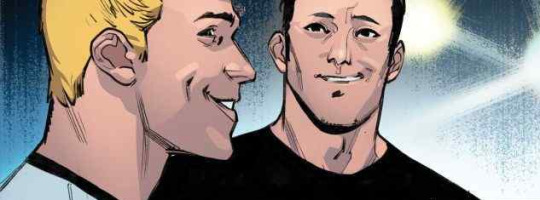
(FF 2018 #1) A small group of Fantastic Four fans have argued for a while that if Marvel was to have Johnny come out, a relationship with Wyatt would feel very natural -- they're already close, with Wyatt being an important Fantastic Four supporting character since the '60s. I have some further analysis here on the conspiracy theory that Johnny and Wyatt were supposed to be in relationship at the beginning of this run but that that plot was, for whatever reason, nixed. I don't know that I entirely believe this theory, for the record -- but I do think the pieces line up remarkably well.
Anyway, that didn't/hasn't yet happened, obviously. Slott instead for the most part put Johnny on the back burner for the beginning of his run, up until the Spyre arc, which I have reason to believe is the main story he pitched that he credits with securing him the Fantastic Four title. The Spyre arc suggests that the Fantastic Four's failed space exploration during which they got their powers wasn't just to beat the commies to the moon, as Lee and Kirby envisioned (simpler days), but to reach a specific planet outside of our galaxy. When the team sets out to conquer this mission, they arrive at the planet, but are quickly captured. The planet, they find out, operates like a soulmate AU -- everyone has a fated person that they are matched to via a gold armband. Reed and Sue are soulmates (and Ben is confined to an underground subterranean with the other monsters, because this is a Fantastic Four comic) while it's discovered! Shocker! That Johnny is actually the soulmate of the one the planet's inhabitants, a winged woman named Sky, with the suggestion that this is both why Johnny's previous relationships have never worked and why he loves space exploration -- he was just trying to get to his Soulmate TM.

(FF 2018 #15) "What's going on here? Where are my clothes?" As you can see, this didn't start off super great, with Johnny being separated from his family, stripped naked, and put in Sky's bed with a soulmate armband slapped on him. Did I mention they're only removable if your soulmate takes it off for you? And that Sky has consistently refused despite Johnny asking her to? Yeah. It's bad. (I think it's important to note Johnny's long history as a victim of assault plays into this narrative, whether or not Slott is personally holding that in mind while writing, which I don't believe he is. cw in the linked post for discussions of sexual assault.) There's an additional issue here in that Slott has a history of problematic writing regarding women of color, featuring characters he's created to act as love interests being oversexualized, infantilized, villainized, or some mix of all three, with two examples of this phenomena being Cindy Moon and Lian Tang, both of whom he introduced in quick succession in Amazing Spider-Man. Slott certainly didn't have to write Sky as manipulative or controlling towards Johnny, but that's what he chose to do, and that factors into the bigger picture of unfortunate themes in his writing.
Sky returns to Earth with the Fantastic Four despite Johnny appearing unenthused about the idea and initially generally reluctant to interact with her. Apparently they went on a few dates after this and kind of made up. I don't know because I stopped reading for about ten issues in there but I feel confident I missed very little. It's hard to talk about the Sky plot without referencing Johnny's previous interactions with a character named Lyja, a Skrull whose relationship to Johnny I have a long breakdown of here. It's doubly hard, because Lyja actually showed back up in Fantastic Four during this plot. Lyja's modus operandi has remained consistent throughout almost all of her appearances, which I guess makes sense, because she literally has no storylines that do not involve her being obsessed with Johnny, and this recent story isn't any different: Lyja shows up, Lyja disguises herself as another woman in Johnny's life to get close to Johnny, Lyja gets caught and claims it was all fine because she did it for love. This time she disguised herself as Sky.

(FF 2018 #32) Not gonna lie, kind of proud of him for this one. That's one of my problems with Slott -- very occasionally, he busts out good moments, only to undermine them with the rest of his narrative.
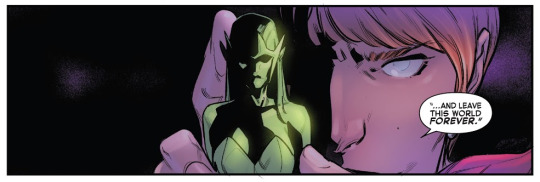
In the same issue, Alicia Masters, the first woman Lyja impersonated in order to get close to Johnny, uses her supervillain stepfather's radioactive clay to control Lyja's mind and send her back to space, and I do think she utilized girl power when she did this. Johnny, left reeling after Lyja's latest attempts to trick him into a relationship, ends this issue by sleeping with Victorious, Dr. Doom's right hand woman.

I know she pegged him. I know it. This scene was a little controversial in Johnny fandom, because a lot of people viewed it as Johnny cheating on Sky and thought that that action was out of character for Johnny. I'm personally of a little different opinion, which is that regardless of whether or not you view Johnny and Sky in a committed enough relationship that Johnny's tryst would count as infidelity when all Johnny and Sky are bound by are magic plot soulmate bracelets, I think Lyja's involvement changes things significantly when it comes to Johnny's characterization. All of Johnny's "playboy" periods, if we can call them that, coincide directly with Lyja having been in and then left his life again, which I think makes a certain amount of sense -- it's Johnny trying to wrest control back after a situation where he had none. None of this is explicitly canon, I have to note, but sometimes in comics you have to do the work yourself. So I think this is a case of something being accidentally extremely in character that Slott accidentally stumbled into because he had these love triangles in mind, not because he put a lot of thought into it.
Speaking of love triangles! Johnny sleeping with Victorious gets more complicated when Dr. Doom announces his intent to marry Victorious -- not because he has any romantic interest in her (this engagement caused a lot of uproar in Fantastic Four because Victorious had been previously referred to as being like Doom's adopted daughter) but in order to install her as Latverian regent in his absence. I'm not going to lie, I love a political wedding. Victorious, for some reason, thinks Doom will be deeply upset that she slept with some closeted blond twink and the member of the Fantastic Four he views least as an enemy and more as an annoyance. Johnny, who Sky is currently not talking to because she "felt" him sleeping with Victorious through their magic plot soulmate bracelets, also feels nervous about Doom finding out about this, which I guess is slightly more valid. Anyway, for some completely ridiculous reason, Victorious decides the best time to tell Doom about this little indiscretion is when they're standing at the altar, which coincidentally the Fantastic Four are also standing at, because Doom asked Reed to be his best man in a not at all homoerotic little setup involving midnight swordfighting and Reed slipping Doom's emerald ring onto his own finger. Sorry to sidetrack into DoomReed territory here but it's just like. It's just a lot.

(FF 2018 #33) Also, Ben walked the bride down the aisle. :,) Look at his gigantic hand.
Anyway then Doom decides he's going to kill everyone in a completely reasonable and not at all overblown reaction to Johnny and Zora having what was most likely both disappointing for Zora and weepy for Johnny sex. And that brings us up to where Fantastic Four comics left us yesterday -- in answer to your "big change" question, that's most likely coming up in the next issue, so it hasn't come to pass yet.
Having gotten all that out of the way -- the last time Johnny and Peter interacted canon-wise was in the recent Empyre Fallout Fantastic Four, at the end of the Empyre event:
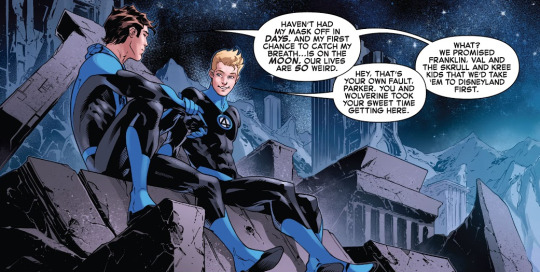

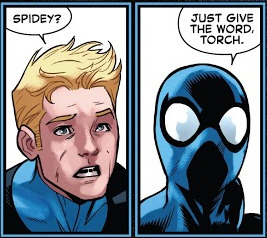
It was cute! Slott does right good interactions between them. This is possibly the Stockholm Syndrome talking. I don't know if more interactions are likely imminent -- the Empyre event was fairly recent. On the other hand, Slott does like writing interactions between them. So I'd give it about a 50/50 shot. I was skimming the letter page in the latest issue and someone wrote in asking if Peter was likely to appear in the pages of Fantastic Four again any time soon, so there is definitely a demand.
As for Johnny coming out -- I don't know. It's not a call I feel comfortable making at this moment, which I guess means I wouldn't bet money on it. I'd like to say yes, especially because I think Slott set up, whether that was his intention or more likely not, several good places in his run where Johnny could have come out. The beginning, when he's implied to be living with Wyatt again and where he and Wyatt are paralleled against Ben and Alicia. Ben's bachelor party, where Johnny laments not finding the right person -- specifically person and not woman -- and where Ben tells him to "be brave, Johnny Storm." And the soulmate planet plot, where I think could have had a very different and much better ending if Johnny had told Sky that she couldn't be his romantic soulmate, because he knows he wants to be with a man. But those are just places that I think would have made good opportunities for a coming out story. Instead, Johnny's been involved (dubiously) with three different women over the space of the last 10 issues, which is more heterosexuality at one time than he's been confronted with in the last 60 years. So my thoughts are still that it's going to happen eventually, but quite possibly not anytime soon.
Hope that helps! And that my incredibly long answer about what's currently going on with Johnny in comics sheds some light on things!
94 notes
·
View notes
Text
I wrote a Thing. It’s extremely long. I’d prefer it not be reblogged; I wrote this for my own catharsis and would prefer it not be circulated, bc of Reasons.
I changed my mind, okay to reblog. <3
Under a cut for (extreme, did I mention?) length.
So I got about 12 minutes of sleep last night, as you do, and around 3am or so I found myself - out of sheer curiosity - going down a meta hole of Ragnarok discourse, trying to figure out where this "satisfying redemption arc" for Loki happened. (I mean, there's a lot of things I would like to figure out, but I started there.) Because I could.
Basically I was looking for meta that went into detail about how Loki was redeemed in a satisfactory way. The ‘satisfactory’ is an important word here bc there is a redemption arc in the film, in that Loki starts off the film as an antagonist (kinda) to Thor and he ends the film as an ally to Thor, standing at Thor's side. In that sense, yes, there's a redemption arc. I didn't find much (and I had no idea how much people just despise Ragnarok "antis" [I really dislike that word] but that's another topic [that I don't particularly want to get into, tbh]) but I did find some. I read what I could find, and I read it open-mindedly, and overall I came away feeling like, okay, there are some valid points being made here and I can kinda see where they're coming from.
But it was a bit (a lot) like -- flat. Idk. The best comparison I can think of is that it’s like if a literature class read, I don't know, The Yellow Wallpaper for an assignment, and some of the students came away from it feeling like it was a creepy story about a woman slowly driving herself insane, and the other students came away from it incensed at the oppression and infantilization of women in the late 19th century -
- and neither side is wrong, but the former is a very surface-level reading and the latter isn't (bc it stems from looking at why she drives herself insane, why she was prescribed 'rest' in the first place, the context of what women could and couldn't do back then, etc; basically, a bit more work has to go into it).
[Note: I am not disparaging the quality of The Yellow Wallpaper. At all. It’s just the first relatively well-known story that popped into my head.]
In this sense, I can see the argument for Loki's redemption arc, but I don't think it's a very good argument. Not invalid, but not great.
I mean, for example, I think the most consistent argument I found variations of re: Loki's redemption is that Ragnarok shows Loki finally taking responsibility for his bad behaviour and misdeeds. This includes recognizing that his actions were fueled from a place of self-hatred and a desire to self-destruct in addition to bringing destruction on others. That he probably feels awkward and regretful of these things and doesn't know how to act around Thor, but he figures it out by the end, and decides that returning to Asgard is the best way to show that he's ready to make amends. His act of bringing the Statesman to Asgard is an apology. He allies himself with Thor and ends up in a better place, both narratively (united with Thor once again) and mentally (having taken responsibility and made amends for his past).
And setting aside that he had already made amends by sacrificing his life in TDW (and also setting aside that the argument is made that Loki redeems himself in IW by sacrificing himself to Thanos but if that's the case, wouldn't that imply that he hadn't achieved redemption in Ragnarok or else there would be no need to achieve it again in IW? Or, if you think he did achieve redemption in Ragnarok, then what the fuck did he give his life in IW for? What was his motivation there, and why did the narrative not make it clearer? I digress.)
- setting aside those two factors, I think this is a very fair argument. Loki is fueled by self-hatred, and he does want to self-destruct, and he does want to inflict that pain on others as well (particularly Thor). No lies detected here.
However, I also need to know where that self-hatred and desire for destruction (toward himself and others) comes from and for that, we need to go back to Thor 1.
Thor 1.
Loki starts Thor 1 out as "a clenched fist with hair," to borrow a quote from the Haunting of Hill House (that I tucked away in my mental box of Lovely Things bc it says so much so very simply). He's very used to bottling everything up, pushing it down; he slinks around behind the scenes, pulling the strings to this plot or that. He's "always been one for mischief," but the narrative implies that the coronation incident is the first time Loki's done anything truly terrible. And it all immediately pretty much goes to shit, so Loki spends the rest of the movie frantically juggling all these moving pieces while trying to seem as if he's got it all under control, every step of the way. That's how I view his actions.
But I always come back to that quote where Kenneth Branaugh tells Tom, of the scene in the vault, "This is where the thin steel rod that's been holding your mind together snaps." In other words this is where Loki discovering he's Jotun is just one thing too many. He can't take it. But though the rod snaps, his descent isn't a nosedive. It's a tumble. As the story progresses, the clenched fist starts to loosen, the muscles are flexed in unfamiliar ways (that feel kinda good, after being stiff for so long), and it culminates with the hand opening completely and shaking itself out. All of that repression, that self-hatred, that rage and jealousy just explodes so that, by the time the bifrost scene happens, Loki's already hit bottom. It's not just about proving his worthiness to Odin. He wants to hurt Thor, too; he, essentially, throws a tantrum. (That's right, I said tantrum.)
(Note: The word 'tantrum’ has negative connotations bc we normally equate it with a toddler stamping their feet and screaming in the aisle when their parent won't buy them the toy they want. But in itself, the word tantrum isn't infantalizing. It's an "emotional outburst, an uncontrolled explosion of anger and frustration" [paraphrasing from dictionary.com]. That's exactly what happens here [and why Tom called Loki's actions a massive tantrum, but people took that to mean Tom agreed it was childish whereas I doubt Tom meant it that way]).
He's been pushed past his limit, and he does bad things. He does really shitty things. He hurts Thor, he hurts his family. I'm pretty sure he knows this all along so this isn't, like, some revelation further down the line that "hey, those things I did were probably kinda bad." He got the memo already.
Ragnarok
Fast forward to Ragnarok, and we're introduced to a version of Loki who's had 4ish years to sit with everything that's happened. To sit with it and not do much else. The rawness of it has faded, and now it seems as though it's just become a thing, like when you move through life aware of your childhood traumas and have more or less just accepted them (and you probably share a lot of really funny depression memes on Facebook, which is kinda the equivalent of Loki's play, but that's probably just me).
Loki has, more or less, chilled out. He seems more bored than anything else; he's been masquerading as Odin for longer than he ever planned or intended to, so he's more or less ended up hanging out, letting Asgard mind its own business, and entertaining himself with silly plays. This is the version that starts out the movie as an antagonist to Thor - a version that is, arguably, in a much different place [and is a much milder threat] than the version who originally did those Bad Things.
And of course Thor is still mad at him, and of course they're going to butt heads, because that's what they do (and Thor's grievances are genuine, I’ll add, bc it's not really his fault he assumed Loki faked his death, nor can he be blamed for being pissed about Odin).
One argument framed this version of Loki as being a person who is facing the awkwardness of coming out of a dark place, which is fair. If we're going to frame his actions in Thor 1 as a tantrum, then Ragnarok would be the part where the toddler has been taken home, possibly has had some lunch and a juice box, and is now watching cartoons. They're over the tantrum, and would probably feel pretty silly about it if they weren't, yknow, toddlers. They probably can't remember why they even wanted that toy so badly. If they're a little older and self-aware, they might even be embarrassed for having melted down.
Like the word tantrum, this feeling isn't a thing limited to toddlers. I know I've had a few epic meltdowns as a grown ass adult, and I know I always feel deeply embarrassed afterwards - like, want to crawl into a hole and die. I've said things I can't take back. Adolescents and teenagers throw tantrums, mentally ill people throw tantrums, adults throw tantrums (I mean, my god, look at all the videos of Karens having screaming meltdowns - screaming! - over having to wear masks in order to shop at stores). Humans throw tantrums. And usually, after the feelings have been let out and the tantrum has passed, humans feel pretty regretful and awkward and embarrassed about whatever they did and said in the midst of their meltdown.
I get all of that and agree it's valid and that Loki probably feels it. By the time Ragnarok happens, Loki's had some time to reflect and think hmm, yeah, probably could've handled that one a lot better. The argument further goes that in order to navigate this awkward period, Loki must come to terms with what he's done, acknowledge that some things can't be unsaid or undone, and begin to make amends. Supposedly, some people feel that Loki becomes a better person because he does "own" everything he did wrong and, even though he feels like a jackass (paraphrasing), he sets that aside to become a become a better person by choosing to help Thor and Asgard at the end.
Thus, the overall arc goes like this. Loki, Thor's jealous little brother,
throws a tantrum of epic proportions bc Reasons
continues to act badly and make things even worse (Avengers)
has to face consequences for his actions (prison sentence)
ends up with a stretch of time in which he's free to contemplate and chill out
feels embarrassed and awkward about how he's behaved
sees an opportunity to make up for it and decides to take it
helps Thor, saves the day, and ends the film a better person.
Redemption achieved.
None of this is wrong. The film supports it. It's a fair interpretation.
But it leaves. out. so. much.
To circle all the way back around Loki being "a clenched fist with hair," and his actions stemming from his self-hatred, you have to ask - how did he get that way? He didn't end up with all this self-hatred on accident. Generally, one isn't born despising themselves, it's a learned behavior. (I realize chemical imbalances are a thing, obviously, as I have Mental Shit myself, but for argument's sake I'm assuming that's not the case with Loki [at this point in time]).
Where did Loki learn it? From his family, from his surroundings, from his culture. We see examples of these microaggressions in the first, like, twenty minutes of the movie - a guard openly laughs at Loki's magic after Thor makes a joke about it (the tone of the conversation implies that Thor "jokes" like this often) and though Loki does the snake thing, the guard faces no real consequences. Thor doesn't acknowledge that anything went amiss. Not much later, on their way to Jotunheim, Loki's barely gotten two words out to Heimdall before Thor cuts him off, steps in front of him, and takes charge. Loki doesn't look annoyed at this; he looks resigned.
Then, for absolutely no reason at all, Volstagg decides to make a jab at Loki ("silver tongue turned to lead?") just because he can. The ease with which he makes this comment and the way that no one else blinks an eye at it implies that this isn't out of the norm. And Loki doesn't react, not really. In the deleted version, he delivers a particularly nasty comeback but he delivers it under his breath, without intending Volstagg to hear it. In the final version, he simply says nothing, though his expression can be read as hurt or stung. Either way, the audience sees an example of Loki being walked all over by Thor and his friends and bottling up his reactions instead of standing up for himself.
Microaggressions matter. They are mentally and emotionally damaging. They hurt. The implication that this is not unusual treatment for Loki means that Loki's probably gone through this for most of his life. It's like the equivalent of being, I don't know, twenty two and you're the friend who has to walk behind the others when the sidewalk isn't wide enough, and it's been that way since the first day of kindergarten. At this point, you're used to it, but that doesn't make it hurt any less when the jabs come seemingly out of nowhere, for no reason other than to make you feel bad.
(I personally identify a lot with this bc I experienced passive bullying in social settings for years. I was the 'doesn't fit on the sidewalk' friend; I hung around with people who'd pretend to be my friend and would be more or less nice to my face, but would laugh at me and make fun of me behind my back for whatever reasons. And often there'd be the random jabs at me, things that would come out of nowhere to smack me in the face, followed by the fake laugh and “just kidding!" so that I couldn't even get upset without being made to feel like I was overreacting and couldn't take a joke. I'd deal with this socially, particularly in middle school when girls are their most vicious, and then I'd go home and, because I was the only girl with a lot of brothers and because boys are mean and because I am who I am, the dynamic was that my brothers would just endlessly roast me to my face and sometimes it was a "just kidding!" thing, where I was the only one not laughing. But that’s beside the point; my point is that microaggressions, passive bullying, and consistent invalidation are harmful and that shit stays with you into adulthood.)
So, yes, Loki needs to be held responsible for his misdeeds, and it's valid to say that he recognizes those misdeeds and wants to make amends. I have never disagreed with that. But the problem with this interpretation is that it lets every single other character who contributed to Loki's self-hatred and mental breakdown (let's just call a spade a spade here, that's what it was; he was broken psychologically) get off scot-free.
First of all,
Odin is not held accountable for instilling in the princes a mentality of Asgard first, everyone is beneath us but Jotuns are benath us the most, they are literal monsters. He is not held accountable for pitting his sons against one another (even if it was unintentional, he still did it) with "you were both born to be kings but only one of you can rule" being the general tone of their upbringing. He's not held accountable for his favoritism toward Thor.
Frigga is not held accountable for deferring to Odin both in supporting the above things and in keeping the truth of Loki's origins a secret while doing nothing to discourage the "monsters" narrative.
Thor is not held accountable for his own tendency of taking Loki for granted (he assumes Loki will come to Jotunheim, he oversteps Loki constantly, “know your place,” etc.. He grants his implicit permission for Loki to be treated as the sidewalk friend in their “group,” a group which is loyal to and takes their cues from Thor as Thor continues to do nothing in his brother's defense).
[Note: Wanting Thor to be held accountable for things he's done wrong isn't vilifying him. Acknowledging that Thor benefited from Odin's favoritism and his own place as Crown Prince doesn't negate Thor also being raised in an abusive environment. I don't think anyone's saying that or, if they have, it's not something I agree with.]
Furthermore,
Odin is not held accountable for his cruelty in disowning Loki (”your birthright was to die” is never going to be forgotten, speaking of people saying things that can't be unsaid or taken back) and in sentencing Loki to a severe prison sentence (life! only bc Frigga wouldn't let him execute Loki) for crimes that are no worse than what Odin himself has committed (around which the entire plot of Ragnarok revolves! Colonialism (and subjugation) is wrong is, like, a major theme [that people rush to praise, even] here).
Thor is also never held accountable for not trying harder to understand what made Loki snap (fair enough, he didn't have a ton of time after returning from Earth, but certainly he had lots of time to sit around reflecting while Loki was being tortured by Thanos for a year). He knows Loki is "not himself" and "beyond reason" and accepts it at face value; he questions it once and then lets it go. He's fine with assuming Loki's just lost his mind, and isn't that a shame. (I realize I'm simplifying Thor's emotions but my point is that Thor could've tried harder to figure out that Loki was being influenced and/or not acting completely autonomously.)
Thor is also never held accountable for - if not facing consequences for his own slaughter of Jotuns - then at least addressing why Loki can't kill an entire race even though Thor tried to do that, like, two days ago. (Granted, it’s difficult to understand how Thor got from Point A ("let's finish them together, Father!") to Point B (this is wrong!), but that failing belongs to Thor 1 (which is not, by the way, a perfect movie).
The interpretation that Loki is fully redeemed because he took responsibility for his actions, returned to Asgard, and allied himself with Thor to save their people is all well and good - but, why is Loki the only one here who has to take responsibility for their actions?
What about all the loose threads in his story?
For example, how did he get from:
Point A (believing himself a literal monster, having a complete mental breakdown, getting tortured and further traumatized after that, etc)
to
Point B (Hey, yknow what would be fun? I'm going to write and direct a play about how I heroically died to save Thor and Jane, and I'll go ahead and have Odin say he accepts me and has always loved me. I'm going to do these things because Odin never said this in real life and instead of acknowledging my sacrifice, Thor left my body in the dirt, so someone has to validate what I've done right and that someone might as well be me. And hey, while I'm at it, I'm going to control the narrative on revealing myself as Jotun to Asgard, instead of living in fear of it being found out, and I'm going to do it in a way that they have to sympathize with me and revere me in death, bc they never bothered to do so when I was alive. And Matt Damon should play me, also.)
to
Point C (Yeah, I guess I feel kinda awkward about that whole tantrum thing, also I should help Thor and support him being king.)
?
The answers to these questions are handwaved and the audience takes that to mean they don't matter. Furthermore, framing Loki's redemption around an act of service (more or less) to Thor makes Loki's redemption about Thor. Does Loki make this decision for the sake of Thor and of Asgard, or does he make it for himself? It's not super clear to me, and I think arguments can be made for both. Which, again, is fine, but - whatever.
If we're going to collectively agree, as a fandom, that Loki is complex, that he's morally gray, that he's worthy of redemption and therefore arguably a good person who's done bad things, then why is it asking too much to have it acknowledged that Thor (also a good person who's done bad things) played a part in Loki's downfall and has shit to apologize for, too? Bc one can only assume the reason is that you're taking a very gray concept and making it black and white by saying Loki has to apologize and make amends because he is the villain, and Thor doesn't because he is the hero (and it's his movie). And it's lazy.
This is where the crux of the issue lands. There's more than one valid interpretation, yes. And no two people (or groups of people, or whatever) are going to consume and therefore interpret or analyze the source material in the same way. I think I saw a post recently about how studies have been done on this, in fact. But, there is a lot going on under the surface that tends to get overlooked when exploring Loki's redemption arc in Ragnarok, as far as I can see, and that’s why I don’t consider it satisfactory.
[I did read similar arguments regarding other issues that are often debated ('debated'), like Loki's magic and/or being underpowered, whether or not Loki's betrayal of Thor was the natural outcome of the situation on Sakaar or not, whether Thor actually gets closure with Odin [if he does, how does he reconcile the father he's idolized with the imperialistic conqueror he's discovered? Why doesn't he hold Odin responsible for covering up Hela's existence and the threat of her return, especially as he knew he was nearing the end of his life? Is Thor's "I'm not as strong as you" meant to imply that he acknowledges those shortcomings of Odin's and that he's okay with them, or that he's just overlooking them, or is he not okay with them but didn't have the chance to get into it bc he was in the middle of battle? T'Challa confronted his father on his wrongdoings in Black Panther; could Thor not have had at least one line that was confrontational enough to establish where he stands as opposed to this gray middle? Can someone explain to me how any of this equates to Thor gaining closure? Please?) but obviously I'm not going to go into all of them (well, I tried not to), bc this mammoth post has gone on long enough (I may not even post this tbh)]
- but my overall point to this entire thing is that when I say I'm critical of Ragnarok bc it's flawed, that Loki's arc was neither complete nor satisfactory, that many things went unaddressed and, due to all of these things, I do not think Ragnarok is a very good movie nor a very cohesive movie, this is where I'm coming from. I have not seen anything to change my mind to the contrary.
But I am not saying that anyone satisfied with it is wrong, or shouldn't have the interpretation that they do. I'm not vilifying Thor in order to lift Loki up, just acknowledging that Thor is arguably just as flawed as Loki without the stigma of being Designated Villain. I think a lot of these arguments get overlooked or dismissed, and that's fine, but it doesn't make the people who do engage with them hateful, or bitter, or trying to excuse Loki's crimes, or feeling like redemption means that Loki's crimes should be erased rather than reconciled.
And sure, yes, perhaps we are expecting too much and exploring all of these themes (or wanting them explored) means that somehow we think it should be Loki's movie (we don't). Loki is a supporting character, but he's still a character. And the movie itself doesn't have to delve into all these things - no one's saying that. (At least, I'm not.) We just want acknowledgement, from the narrative, that this stuff was an Issue.
This could have been accomplished with -
Some dialogue closer to the novelization (and original script), like Thor and Loki both acknowledging the harm they've done one another and their kingdom due to their Feels.
A single line of Thor confronting Odin, or even asking "Why?"
A narrative acknowledgement that Odin did both Thor and Loki dirty (”I love you, my sons” isn't an apology, because it doesn't acknowledge either that there's been wrong-doing or express regret for having done the wrong in the first place).
A little bit more nuance in the way Loki treats his own past (ie, instead of flippantly telling the story of his suicide attempt, maybe - if it must be flippant - talk about getting blasted in the face with Hawkeye's arrow or sailing through to Svartalfheim [And in that moment, I sang ta-daaaa!]) or whatever.
I recognize that wanting full, in-depth exploration on all of these issues regarding a supporting character is probably too much to ask or expect - but, I also feel like, if you're going to be professionally writing a narrative (or rewriting/improvising, as it were), it's not too much to ask that a little more care be taken in regards to all of the layers that have contributed to said supporting character's downfall and subsequent redemption arc. I don't think that's an unreasonable thing to want.
And maybe if there had been more nuance and continuity in how these things were portrayed on screen (ie, if TW had actually done as good a job as his stans think he did), the fandom wouldn't have divided and conquered itself over which "version" of the same character is more valid and whether or not the film did its best to close out a trilogy (not start a new one), to the point where everyone in this fandom space makes navigating it feel like walking through a minefield.
But, I mean
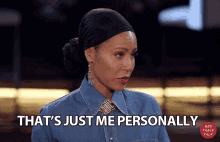
(Again, please don’t reblog if possible.)
Edit: Okay to reblog. <3
#i tried to format this so that it wasn't just#walls of text#sooo#ragnarok critical#anti ragnarok#charlotte's loki meta#negative loki meta#fandom wank#i wrote this bc i needed to get it out#bc seeing some of those posts last night was rough#both meta wise and 'antis are horrible people' wise#it was cathartic#but i don't want it to be reblogged bc#people are mean#to put it very simply#so there we are#clearly i didn't have much work to do today#i don't know how else to tag this#anti anti anti#if you like ragnarok skip this post#i am criticizing ragnarok in this post#mood gif
97 notes
·
View notes
Text
Reaction to The Devil Judge (spoilers for ep. 11-12)
Hello everyone! I hope you’re doing well this week!
Here we go! Again i’m really sorry for the english & my personal interpretations which might go a little bit overboard (❁´ω`❁)
THIS GOT VERYYYYYYYYYY LONG PLEASE BEAR WITH ME!!!!
tldr: i am in shambles haha
Have a nice week and take care! ♥
- Huckleberryfinn’s new OST, The Nights, was released this saturday and it’s truly a gem! The guitar/bass’s place in BOTH OSTs they composed is awesome. The lyrics destroyed me haha (i’ll shortly talk about it below!). The soundtrack during these two episodes was awesome btw ;;
- Sun-Ah’s visit to the mansion felt nostalgic and shattering at the same time, she sees she doesn’t belong in this house but still indulges a little in this illusion, « wanting to fall for his trick even just for a little while ». Her expression made me feel for her for a little while too ;;
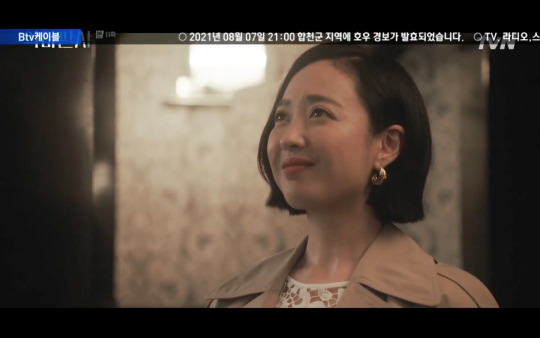
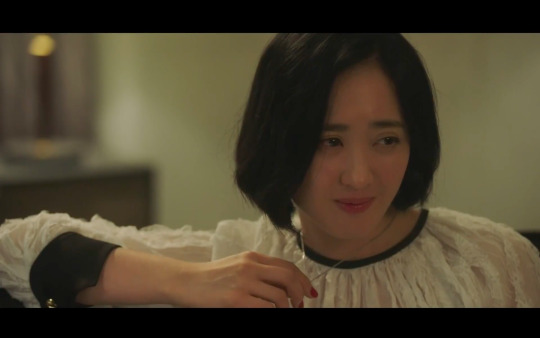
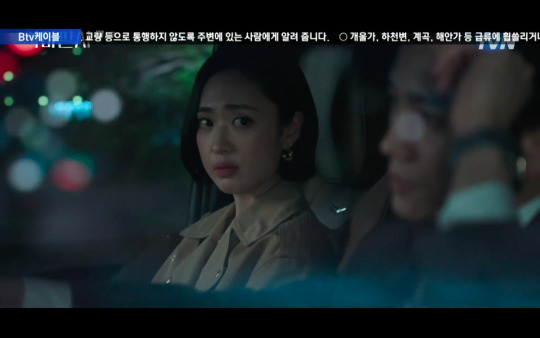
This shot above is funny because the bokeh effect (✨ the little sparkles ✨) is used in the background every time but this time it plays in front of Sun-Ah’s view: she sees in Yohan and his mansion a « shining » thing she desired for a long time. The bokeh here served also as a transition to the flashback right after.
Well, it could just be the streetlights’ reflections on the car and me reaching but there are so many symbolic visual shots in this show already i just couldn’t dismiss it in my brain haha
I liked Sun-Ah’s depiction of her choice to go against Yohan: she drops the necklace (symbolizing Yohan, this scene followed by Yohan’s cross-like scar) and not herself, like she did in the past for/because of Yohan when she was a maid + Yohan’s reflection disappears, Sun-Ah only focusing on herself: the ‘us’ she wanted for some time disappeared. And this event makes Sun-Ah’s rage on K more upsetting than it already is, but maybe i’m reaching haha
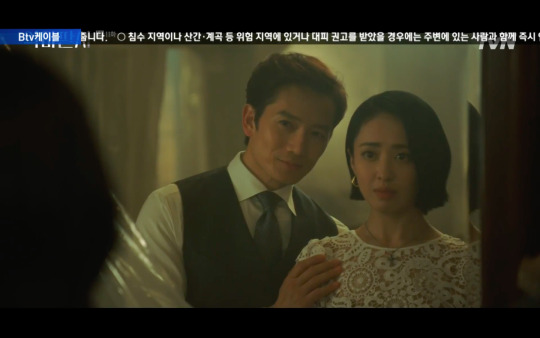


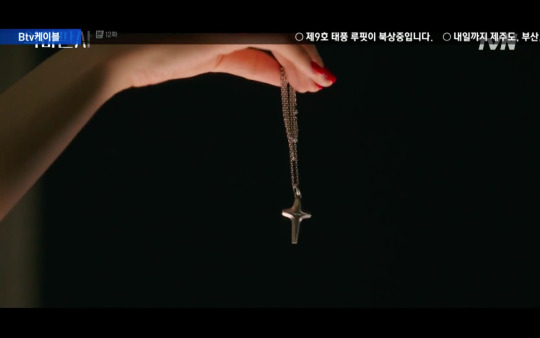
This scene also shows Yohan and Sun-Ah want two different directions to their relationship: to use her and to have him reach the top by her side respectively. They both look at the mirror, but their focus is different and they’re set in different plans on the shots.
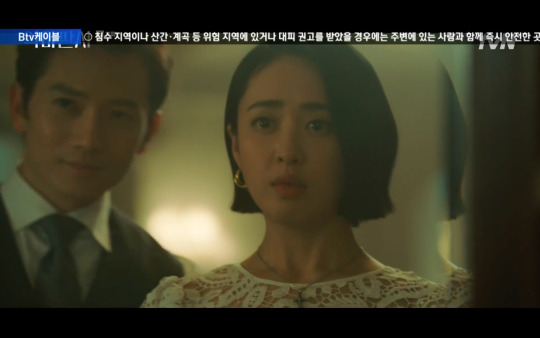

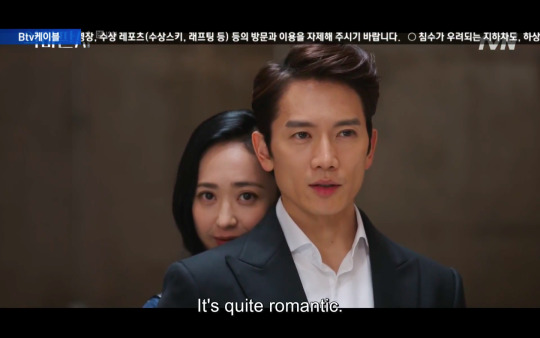
In My Mister, (SPOILERS) the wife has a serious affair with her husband’s superior, but throughout the drama, they have divergent opinions on their affair’s developments: the wife wanted to leave her husband and settle with her lover, while the latter didn’t think any of it and, among other plot reasons, only wanted her because married women are the ‘safest choice (ending the relationship while she still loves him would be more troublesome) and always kept the affair secret’.
This was particularly symbolized by their song preferences, but also by this shot in the beginning of the series: after the wife shared her hopes about their relationship (and her lover staying most of the time silent), they both look to the distance (their affair’s metaphorical future) but their eyes almost never look in the same direction.
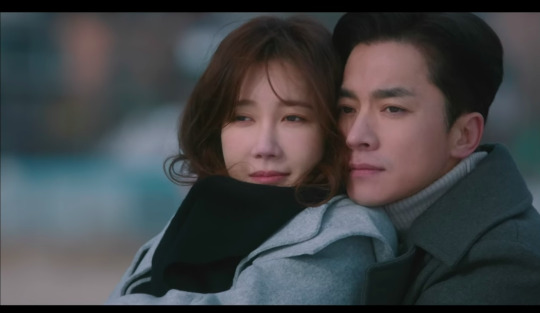
- « I did it because i need you (by my side?) », Sun-Ah and Gaon’s parallels:

"[To Gaon on ep. 8] I wanted you to be by my side.”


“[To Gaon on ep. 5] I don’t need you to understand, but you need to make a decision. Will you stand in my way … or stand on my side?”
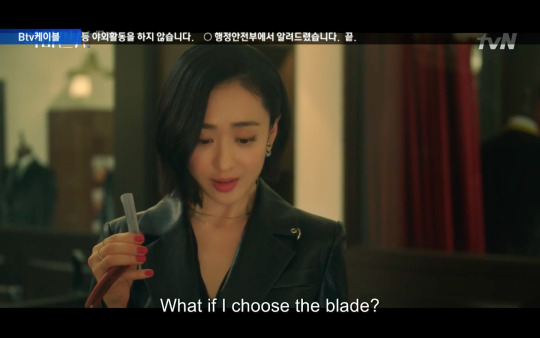
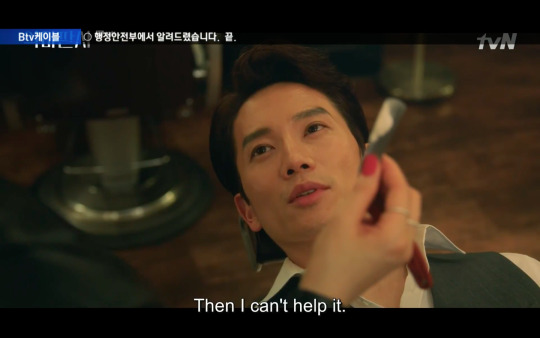
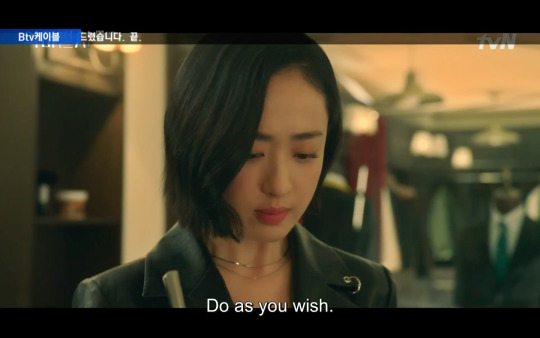
"[To Gaon] If i needed to, i would’ve done something even worse. Whether it was switching him or something else.”



- When Elijah and Gaon play jenga, Yohan might have let the door to his bedroom open (even after leaving them the first time) to continue hearing them have fun in the living room. It parallels to the scene in ep. 5 where he watches them play in the garden with Kkomi through the little gap of his curtains: what piques his curiosity first is the playful conversation he hears from his bed even from the closed windows. The flashback explains it all and i’m glad Gaon insisted to have him play with them despite the front he tried to put on, Elijah’s and Yohan’s expressions in this scene ended me ;;
Look how quick he turned his attention to Gaon, as if he waited for something to happen, to get to play with them!! His eyes lit up in an instant i can’t with this —

I loved how Yohan delayed his defeat to Elijah by asking Gaon questions about the game hahah
Elijah and Yohan’s relationship growth here reminds me of 2 parallels i didn’t catch the first time (but the desperation i felt when Gaon left because everything could grow cold again between Elijah and Yohan):
“That’s everything i think about”:

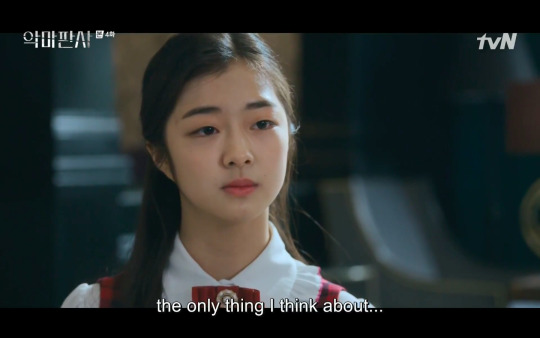


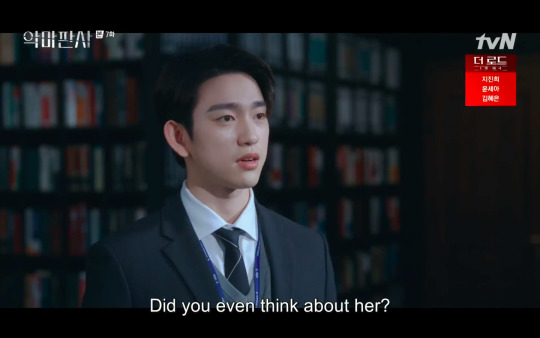


Elijah getting in & out of the car (ep. 6-9):
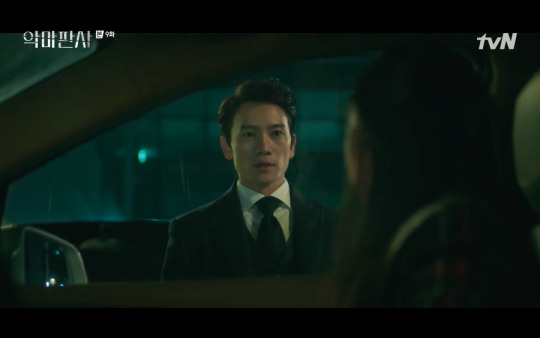



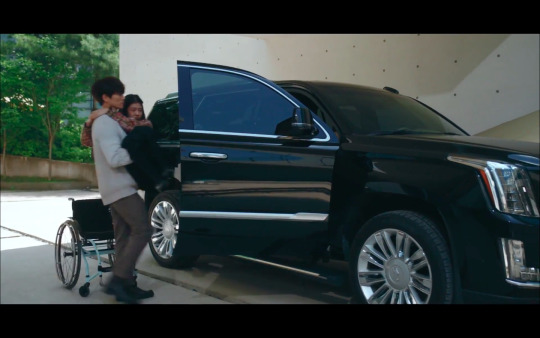
- And Gaon’s « Once everything is over, i’ll definitely … » — you’ll definitely what, please tell the audienceeeeeeee ;;;; this screams a death flag for Soohyun (or was it just foreshadowing their confrontation in ep. 12? idek anymore haha), but let’s hope it’s not!!
- After CKH’s suicide: we can’t expect people to make perfect choices every time they are challenged, and i think this story shows it well: Soohyun when she was with Elijah, and now Gaon carelessly touching the minister’s body for the files. As judges, they could have searched the body and the room using a fabric to hide their presence. But they’re both shocked: Yohan looks dumbfounded, standing and watching (even though he’s quicker to react when he sees Soohyun and he puts on a composure at the house saying it was ‘nothing’, he looked very sour when Sun-Ah called him to rejoice in her death) and Gaon panic-stricken. The fact he might have relived his parents’ suicide when he discovered the Minister’s body … And in the worst way possible (in a daze, searching her dead body for her files and realizing he didn’t give the body minimum respect) … oof
At least Yohan could have thought about it since the story shows how prepared he is in his plans, but this scene shows even him is at a loss at what to do. After all, the minister was the way he targeted to bring everyone linked to the foundation down. They were so close, i think he was too convinced her « self-pity » would mean her survival despite everything (« Do you have any other options? ») to see what was coming. After all, when they last met, he saw she was about to shoot him.
Sun-Ah was the only one he thought was ‘unpredictable’. When Gaon talked to CKH, he let him speak and approved his speech, surely thinking everything went along his plans and the minister would surrender. And i think that’s also why he gives Gaon all this speech, to reassure himself and them, since they work now as a team.
- Ep. 9 foreshadowing ep. 11 and 12 (Soohyun facing Yohan and Gaon). It’s interesting how the two shots from ep. 9 seem to put on the same plan the three characters, as if Yohan is literally standing between Soohyun and Gaon, as if he was the one protecting/separating him from Soohyun. This is very telling of the whole dynamic between those three.

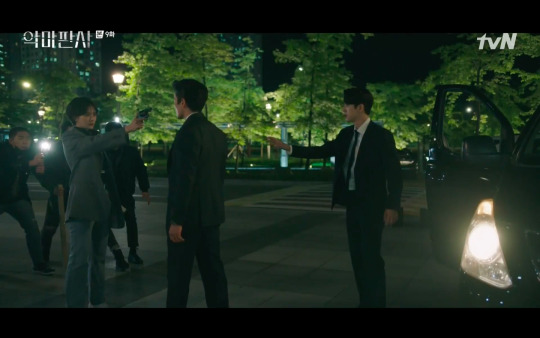

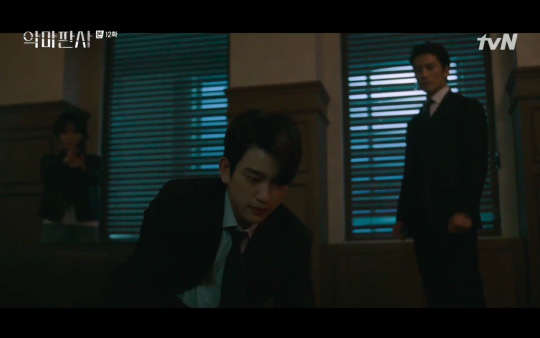
- When the minister said she didn’t want to clear her name regarding her son in the live but still does so anyway, this is pure preterition haha! It’s also why she reminds the public opinion the first case Yohan handled!
- Cha Kyung Hee’s demise (ep. 11-4 parallels):
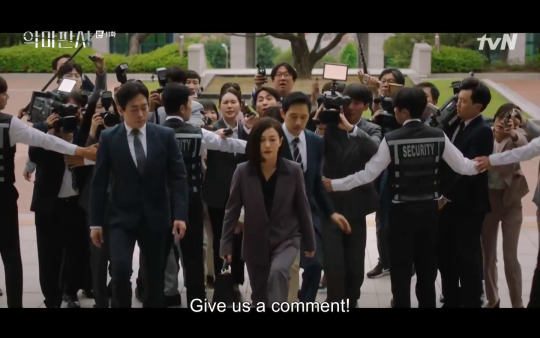
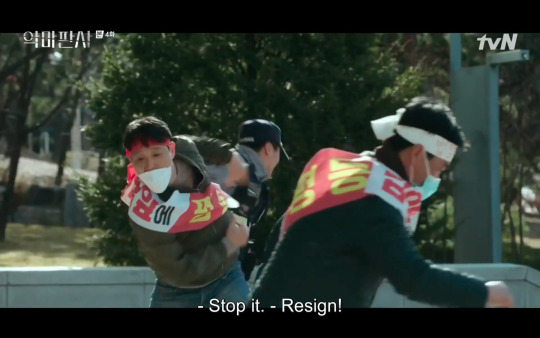


(+ a cinematographic reference to the 2000 movie Malèna, which was recently used in Hwasa’s MV for the song Maria)
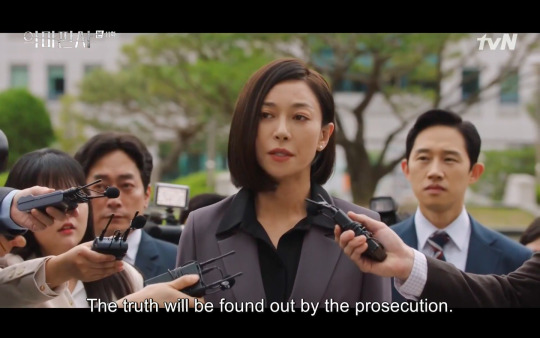
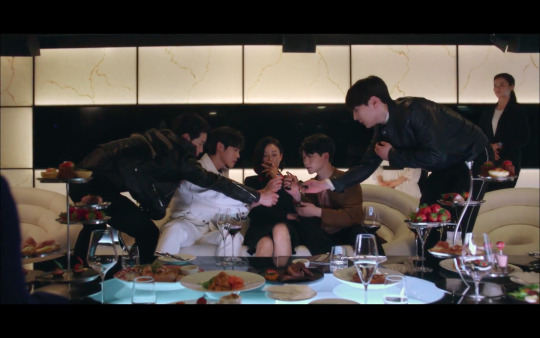
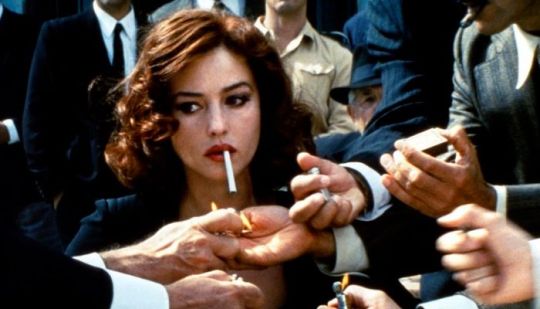
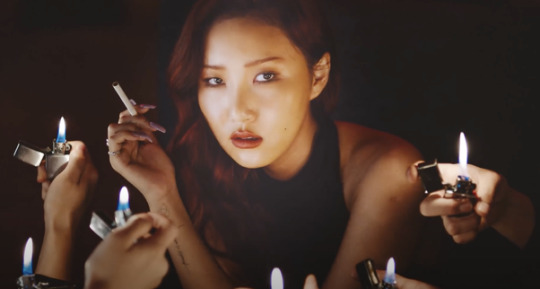
- The scene right after where Soohyun wipes Gaon’s involvement to the suicide was moving in regards to her character, we get to see how torn she is by this situation + when she faces off Yohan in the parking (and the ‘let go’ could also have referred to Gaon) … i felt bad for her!
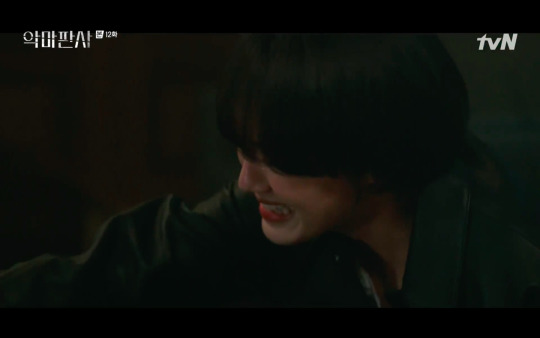


- About Soohyun & the professor: I find interesting the way the professor and Soohyun shelter Gaon’s existence was clearly shown with these two episodes and through their rage. At the beginning of the drama, their hold on his life’s values and choices was almost impalpable but not anymore, now that they’re facing Yohan’s threat.

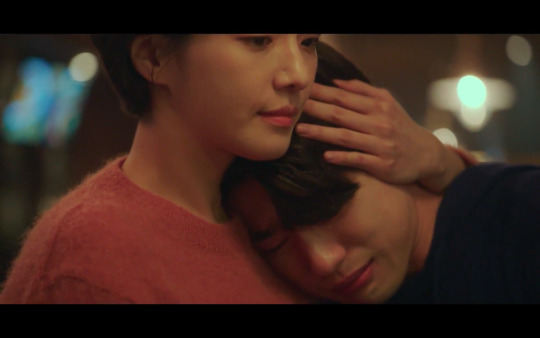
In these shots, Soohyun looks like she is covering Gaon’s ear, turning him away and protecting him from outside (from the pain, Yohan, the rest of the world).
And on professor Min’s part, it’s almost infantilizing, de-responsibilizing Gaon to say the least (« What are you making Gaon do? That child has been through so much. He suffered and struggled through the worst to get there. »), given he’s the one who planted him on the court’s bench to find what’s happening behind the scene: he could have asked Gaon for explanations (as Yohan underlined, « Did you hear it from Gaon himself? ») but he just snaps at him. He should have foreseen that he could’ve taken Yohan’s side.
For his defense, his family just got targeted but still, it’s the first time Gaon came back since then!
(By the way, that whole conversation with professor Min confirmed to Yohan Gaon didn’t admit to their plan to Soohyun nor the professor)
As for Soohyun, her deep concern for Gaon makes her antagonize Yohan and, in her POV, it’s pretty understandable: her friend got locked up in this judge’s house for days with no phone or permission to go out + said judge seems to not let her niece go out with her new friends, got violent against Gaon + he seems to be plotting something behind the trials he biased + Gaon’s description of the man in the first episodes wasn’t that nice but DESPITE IT ALL her friend still seems to be empathizing with him?
She’s maybe thinking he got manipulated by Yohan given the evil picture he depicted her & must feel helpless in front of Gaon’s sudden change of heart. I think that’s what she wanted to ask him when she got cut by the professor’s arrival. The lack of honest conversation between them is what’s making it worse: on one hand, Gaon goes to her every time he feels sad or confused to get comfort & advice without telling what truly is going on (or eventually telling her when she insists), on the other hand, Soohyun always tells him to give up his investigation on Yohan and never asks him his point of view to understand the situation.
And she discovered he lied about him not being involved with this man in the worst way possible, finding him by CKH’s body with Yohan. He was her reason to dedicate her life to protect people under the law (he does not owe her anything in no way, but it was her wish), and she ended up dirtying her hands for him. Her gut reaction to her moral principles being violated by both Gaon and her right now is stronger than wanting to hear the truth from Gaon. She continues to investigate Yohan on her own, to protect him. It was interesting to see this sententious side when she confronted Gaon after all this! The only time Soohyun saw him cry and didn’t support him, it hits hard ;;
But i believe the whole crisis that’s happening by the end of ep. 12 will make them team up again at least for a while. And on that note, will she meet Sun-Ah? It would be interesting!
I’m glad the professor raised as a concern on the live trials the due process & fair trial, which are essential for the rule of law to prosper.
In fact, the live trials slowly become a place of majoritarianism/ochlocracy/mob rule as the cases progress (the two best examples being the actor and Juk Chang cases), the protests against professor Min are another example. Even if Yohan has the last word on the defendant’s sentence, this issue is still there.
Maybe the viewers’ voice will turn against Yohan one day?
- The minister … Even though the story showed us how cruel her family could be, i can’t help but feel sympathy for her son with her suicide. And that is accentuated by the fact her family’s grief is not even showed, covered by the mediatic chaos. She could have fled the country as her son suggested, but she thought she was « nothing » without her accomplishments and her path to glory. As the former president of the foundation killed by Sun-Ah’s hands, she died in her office as the Minister of Justice, while her image wasn’t torn to shreds yet. The photograph she held showed her at the center and, ironically, it’s the only figure from the photo who is clear-cut, her husband and her son are out of focus (or it could just be the episode’s image quality misleading me haha). Even though she loved them (well, at least in her manner, which was kind of narcissistic tbh), she cared too much for her success and her death was her act of self-pity.
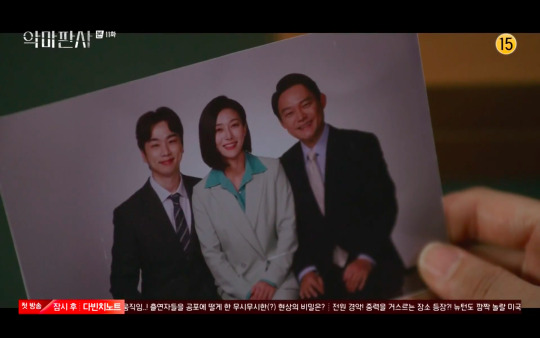
- This isn’t the first time Gaon was warned about Yohan and i find it interesting it’s the people closest to him that say that, especially K despite (or precisely because?) his loyalty to him. Elijah also warned him before.
- The whole argument … It’s a progression of ep. 5 & 8 scenes (’will you stand in my way or stand on my side?’ & ‘i wanted you by my side and if i needed to, i would’ve done something worse’). You can tell how desperate Yohan was when he reached out to Gaon. His gaze faltered, showing his hesitation to do it, but as the realization he was going to lose him dawned on him, this touch became a necessity in front of the exigency, making up for everything he couldn’t say out loud. It was a sad & hurtful mess. Yohan truly looked short on ‘arguments’ after Gaon’s question (‘what kind of monster am i turning into?’), he seemed to not even know what to say to make him stay, making him pause before talking about Soohyun.
The way his eyes lit up, almost smiling, full of hope, when he finished laying his ultimatum and how he regained a composed expression, thinking Gaon would take his side maybe?


I didn’t catch it on the first time, but Gaon’s sadness to end/put a hold on their collaboration (thus their whole relationship, stepping out of his life) transpired through him weakly rejecting Yohan’s hand with his own hand sliding down the latter's arm, as if he was unwilling to let this life with the Kangs go. You can see it’s hard on him to leave with the tears in his eyes.
I think Gaon’s response outran his thoughts, as a quick riposte, it was to make Yohan stop this. The way things went (well, it escalated QUICKLY), hurting him like that was the only effective way, and he knows it will hurt him: before saying Soohyun is his world, he tears up because of that (in addition to everything Yohan said and it was A LOT), and didn’t even have the strength/will to get angry like all the previous times:
the fact Yohan laid this very ultimatum and wanted to persuade/manipulate him into thinking this was the only choice. Even if he knew Yohan would be capable of doing this since ep. 7-8 (”To achieve his goal, would he not use another man’s pain? If the devil really did exist among us.”), he got a confirmation and it still hurts.
+ the fact he knows he has to hurt him with something as much as hurtful before he takes it too far.
+ the fact he knows he can’t live in this house any longer because of this argument when he made all these memories with them.
And (let’s hope for it) if Gaon wants to show Yohan there’s another way out of this ultimatum, Gaon’s « Soohyun is my world » might be a counter ultimatum (‘to stay by your side, you’ll have to deal with my world because there must be another way, there is no question, or else you’ll have to deal on your own’). He’s still not said anything to Soohyun (well, he didn’t have the opportunity to anyway but even during their confrontation, when she asked for details, he said nothing) nor the professor, so maybe that’s it?

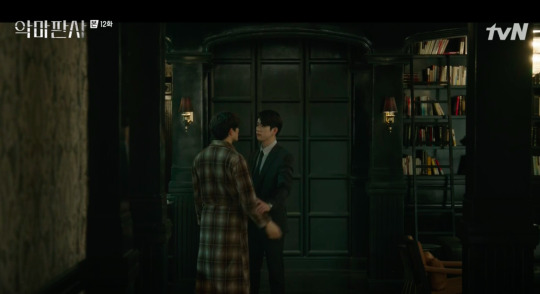
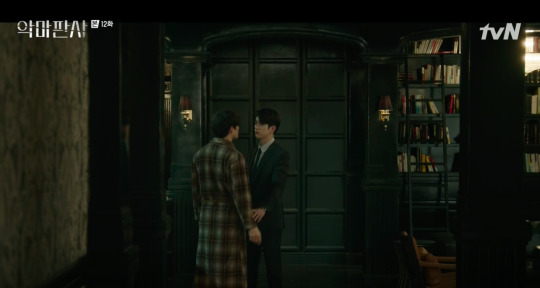
- « Of course it doesn’t matter to me, but … » ELIJAH NOOOOOOOO ;;;;;;;;; After Yohan, Elijah tries in her way to hold Gaon back — and she makes a valid point tbh (look at what happened by the end of the episode!), but seeing her putting all her efforts and realizing it’s failing is heartbreaking … Given the preview for ep. 13, please let me hope this conversation won’t be their last one!!
- Utter devastation when the next scenes show how Gaon still shines even in his absence: the « You never apologize » + the scene with the nanny & Gaon’s last prepared meal + Gaon’s portrait by Elijah … ugh

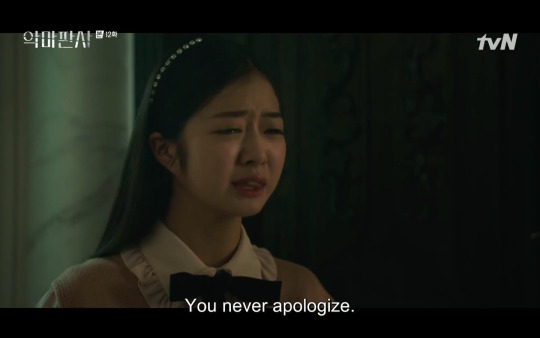

- Elijah’s painting game is too strong, can’t relate haha! I wish they could show the BTS for this painting, respect for the artist behind!!
- On metaphorical images, Gaon took care of the Kangs like he tended to his plants at home. On a regular basis, he provided them attention and care, making them lively as his plants got lush. On ep. 8, we got a shot of Elijah smiling at Gaon’s plants, sort of a confirmation she loved how their house became warmer since Gaon’s stay, which led her to open up to his uncle.
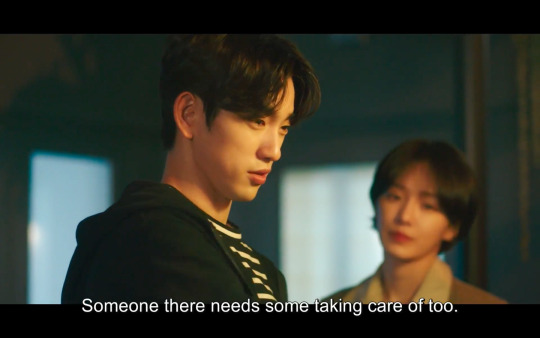
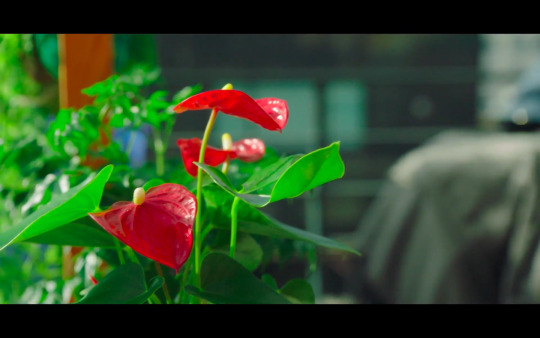

- Now they’re only four! It looks like the mafia game haha, i look forward (am i though?) to the day Sun-Ah sits by herself haha
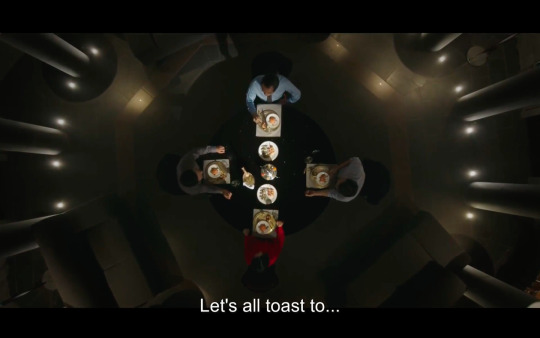
AND THIS MAN
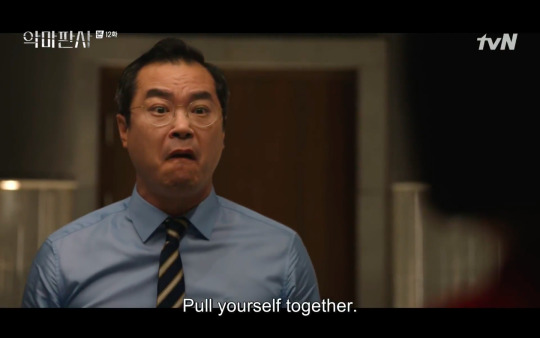
This is true pig behavior, especially considering Sun-Ah’s past … I felt her reaction when he said all this bs to demean her, she had all her struggles with men thrown back to her face, soiled by these « jokes ».
- The monsters, the abyss and Nietzsche:
« He who fights with monsters should be careful lest he thereby become a monster. And if thou gaze long into an abyss, the abyss will also gaze into thee. », Nietzsche



- « I don’t care if humanity falls, as long as i have you two ». It was what he wouldn’t say to Gaon nor Elijah, and yet they’re his world! This sequence parallels Gaon’s inner wish when he leaves the Kang’s house + the flashbacks of his fond memories with the Kangs. Will Yohan give his vigilante ideals up for them? Will Gaon pursue this dream but in his own way that won’t threaten their « worlds »?
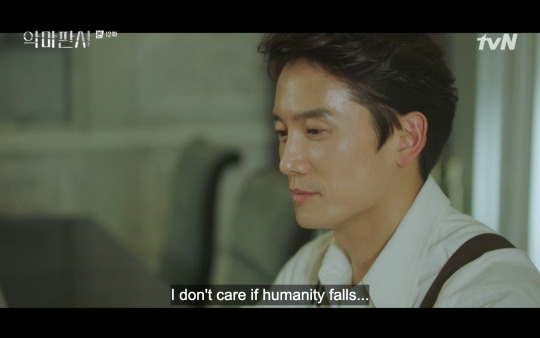
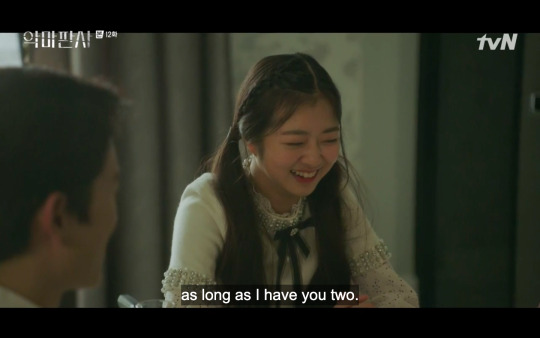



(Now we know what his whole world meant)
- The light from the chandelier (ie. their newfound family) is out of Yohan’s (metaphorical) reach, shown by its blurred silhouette, as if it’s gone from the room which regained its initial colder tones. But it’s not: once it’s made its way in the room, it remains and lingers, as a keepsake of the lost warmth. His fond memories with Gaon and Elijah flashed back through the window’s light.
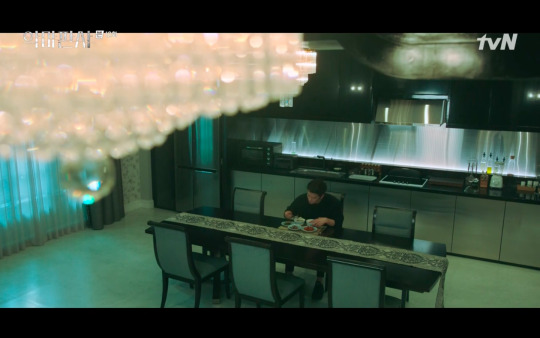
On a similar note, Gaon’s room, albeit having warmer tones than the Kang’s ones since the beginning, looks dark too. The contrast with earlier episodes is clear. This reminds me of My Mister’s (SPOILERS) full shots of Lee Ji An’s room, getting warmer as she gets to know Park Dong Hoon, and losing all its fond colors when she has to leave for his sake. As if the room and inanimate objects were given life by their owner, imbuing them with their feelings. It becomes an outer expression of their feelings. Sorry for the rambling but i just love when they do that in fiction, and i think it sometimes leaves more impact to the viewers if emotions are conveyed through various angles (eg. through another character’s point of view, sounds, looks, the use of light i mentioned below, etc) !
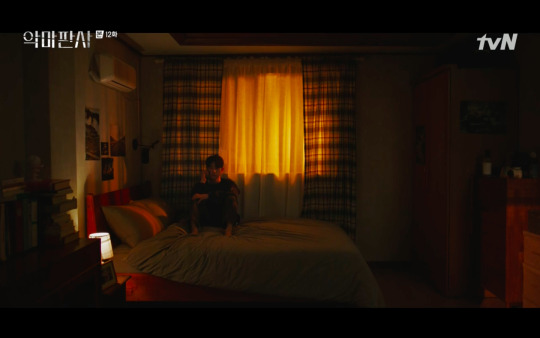
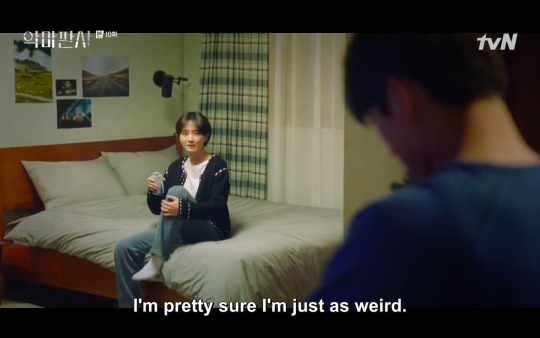
- I wonder … since the flashbacks are giving us Gaon’s conscious point of view on this separation, was he awake when Yohan came back from his (forced) encounter with Sun-Ah? It’s a really minor point but it could be an interesting detail since this show always shows us there are some sides or spots to the stories we didn’t have yet!

The jenga scene also flashed back but this time we see Gaon’s POV seeing Yohan’s smile & we got Gaon’s angle when Yohan had a nightmare in ep. 5: while from Yohan’s POV, Gaon’s irruption truly felt like an invasion of his intimacy (the quick succession of shots expressing his panic and defensive reaction), from Gaon’s POV only one angle showed the scene, the tension was conveyed only when Yohan slapped his hand away.
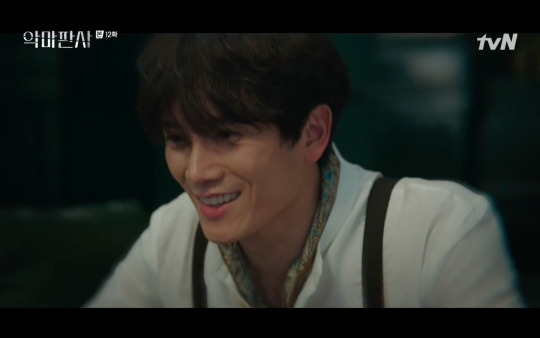
We also got Yohan’s POV when he admitted to Gaon he needed him by his side (and a closer look at Gaon’s troubled expression)!

- Ep. 5 and 11-12 parallels:
Yohan’s tentative look at Gaon and Elijah playing outside, as if he wanted to join them like in ep. 11, the curtains mainly closed and only pushed by one of his hands. It let the daylight in his dark room through this sneak peek.

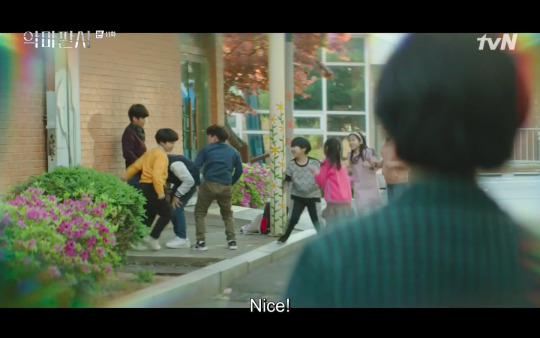
But in ep. 12, the curtains are drawn, Yohan taking the (moon)light fully in. And this time, he doesn’t reach out to his late brother in the flames, but to the moonlight. He gets up, as in a trance, from his nightmare like the last time, but he goes to his window instead. And it reminds me of both Huckleberry Finn’s OST’s (in Tempest, « you said i’ll live in the sun / moonlight » and in The Nights, « my / your night shines on you / me »), the suffer is here. And see how the light reveals his tear? I nearly missed it!

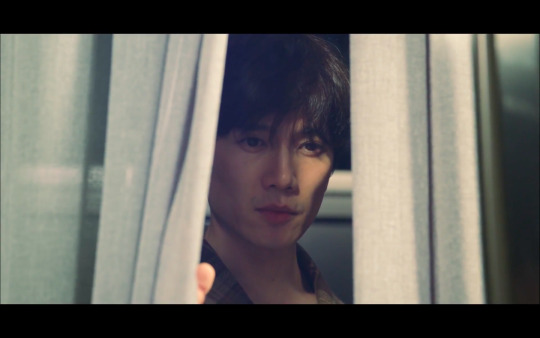




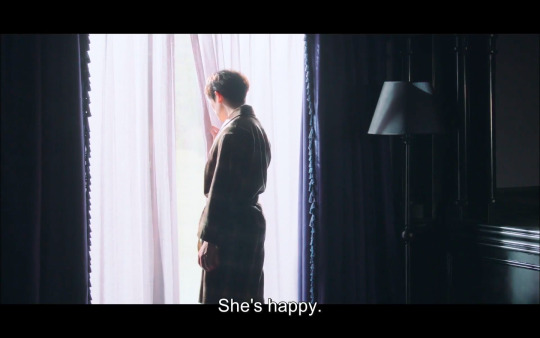
The fact he could not find sleep anymore after this night + he slept on his sofa where the moonlight could be seen + has kept his phone right next to him (in case Gaon called him or to know if something happened to him) ➾ 🌝 pure devastation 🌝


- I really love the show’s use of light/dark tones to reveal and contrast its characters’ emotions! What you can’t see in the light gets revealed in the dark, and vice-versa. The OST The Nights touches on this subject as well.
And it ties up very well to the plot so far: everyone has his or her own motivations and intentions, background, and makes choices, but depending on the perspective, their story changes and sparks off different reactions. Everybody’s story is interconnected.
As @skylessnights pointed out, one of the books found during the series (when Yohan revealed his past to Gaon if i’m correct), The God of Small Things by Arundhati Roy, depicts this angle well in its plot and epigraph: « Never again shall a single story be told as though it were the only one. » - John Berger.
When Gaon and Yohan go back to the mansion after CKH’s death, the route lights flash Gaon’s hands red, caught (literally) red-handed by Soohyun. He begins to recollect his recent memories of what just happened, and panics, short-winded, until Yohan touched his arm. He’s startled but calmed himself down, and we don’t hear him out of breath anymore. It’s interesting how the light’s focus was on Gaon’s hands, the core of his panic, until Yohan’s arm came into the light, as if our and Gaon’s attention went back to Yohan’s touch, his anchor in his panic, and begins to think clear-headed of what they had done. (btw, getting Phoenix Wright desperate vibes from Gaon’s pose haha)
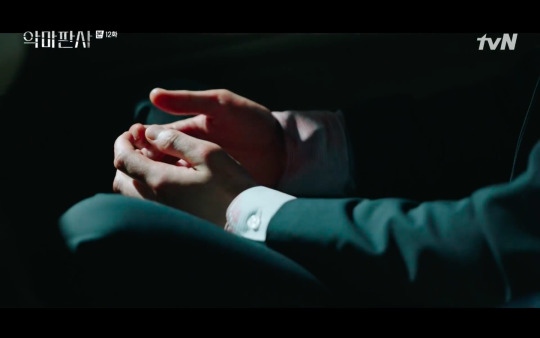

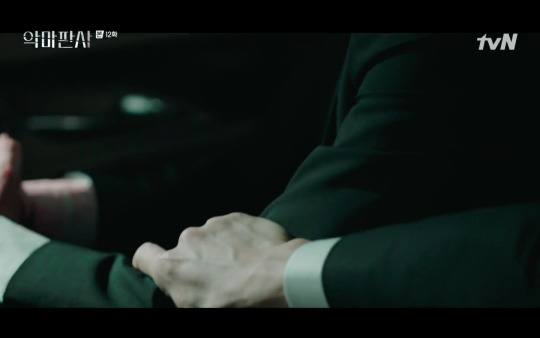

Gaon’s emotions show when his phone lights up, trying to reach Soohyun again.
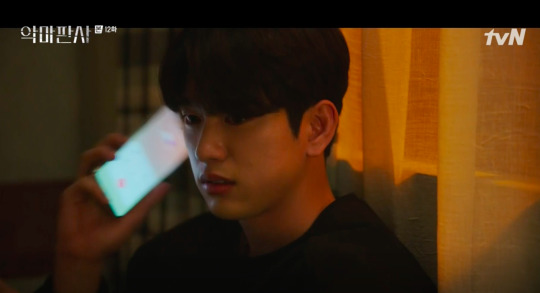


When Yohan’s inner wish brings him back to their happy times, the end of the flashback shows a shot of his eyes dazzled by the light of these memories and back to the present, the light now gone out from his eyes.

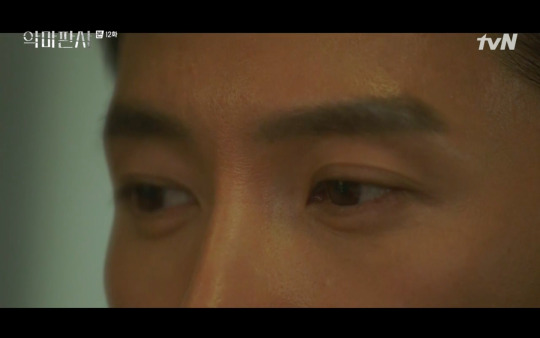
Yohan’s reaction to Gaon’s cry in the prison yard in ep. 7: what i loved to see was how his restraint told more about the emotions he held back. The light shifting on his face revealed his jaw clenching & frowned brows, his glassy eyes and him averting his gaze, which he often does when he’s in front of sensitive topics and it’s too much.

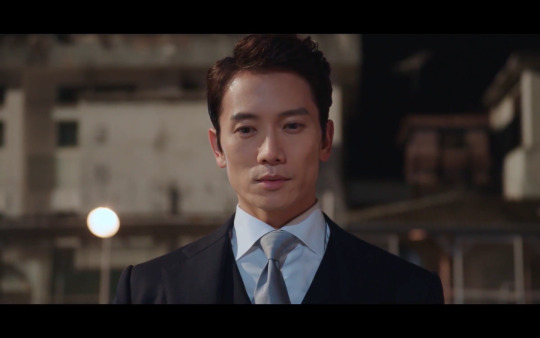
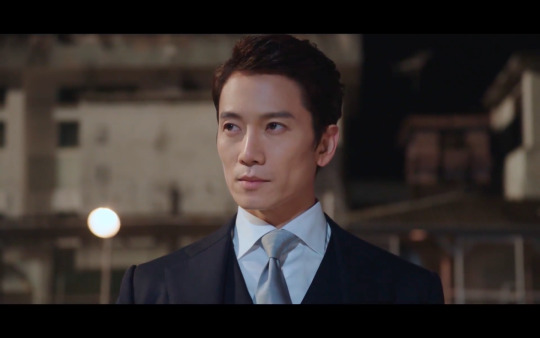
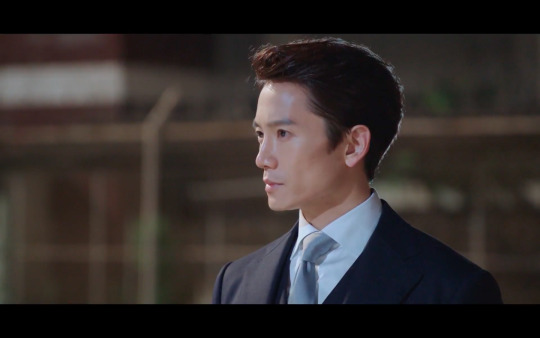

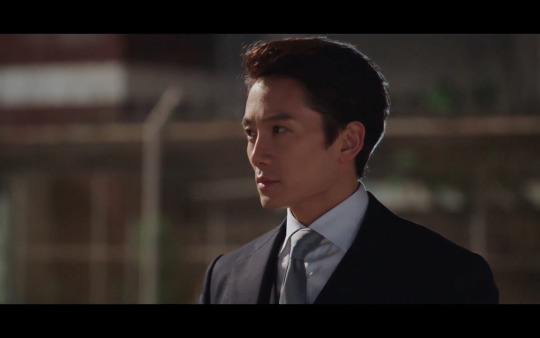

+ other instances he looked away:
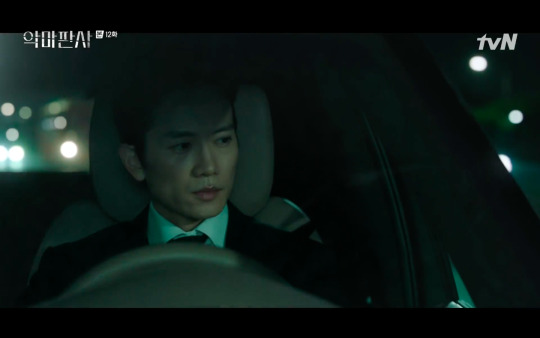
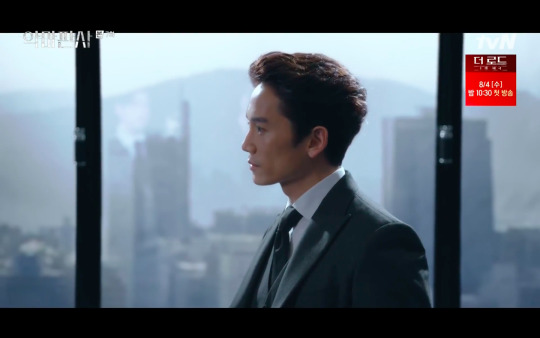

When Jinjoo decides to accept the foundation’s offer, she steps into the dark side of the room where the two chairmen are. Up till now, she stood where the light could reach her, away from them. It symbolically seals her involvement with the foundation, and by the end of ep. 12, it is confirmed by her message on behalf of the foundation (about the plague) displayed on the screens. By the way, i love the fact so much things unfold while we focus on Yohan and Gaon’s story!
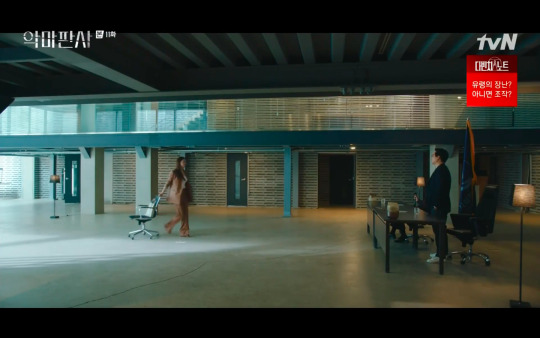

On the subject of ‘subjective’ truths, examples, besides the flashback with the priest about Yohan in ep. 11, could be the truth behind the cancellation of the donation by Yohan or Sun-Ah’s fall from the window when she was a maid. We got Sun-Ah, Elijah, and then later Yohan’s point of view.
- I think Gaon tried to call Soohyun and not Yohan (though the subs say otherwise) because the contact above has the ‘thug’ nickname with the fist emoji! It made more sense, Yohan would’ve answered right away! But i believe he will have regrets/worries in the next episodes (Yohan and Elijah seem to be getting in real danger so maybe he’ll come back to save them).
- Metatextuality in The Devil Judge — Beauty and the Beast (written by Jeanne-Marie Leprince de Beaumont & Disney’s 1991 animation movie)
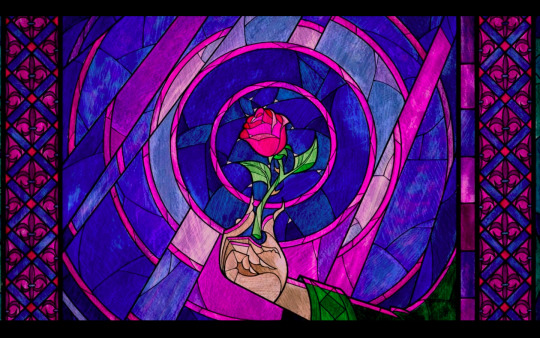
I’ve always loved transtextual relationships between fictions, my french teacher in middle school gave us this passion haha! Ever since i read this interview translated by @deviljudge, it’s true i’m getting more and more Beauty and the Beast vibes, especially from ep. 12’s argument (and the whole premise Belle got locked up in the mansion in the beginning)! The original fairy tale and Disney’s adaptation are both relevant, some plot points differ from one another (Belle’s sisters vs Gaston, the mansion personnel turned into living paraphernalia) even though the core of the fairy tale is left untouched but for the sake of this bit, i’ll use the 1991 movie because its inevitably longer format delves more into the fairy tale moral lesson.
(Cheesy time incoming haha) The beast lets Belle go see her father he knew she deeply cared about, and let her go because he realized he loved her. He thought she would never come back, but despite it all, she came back and saved him from Gaston. Belle (Gaon) broke the spell that was casted on the mansion (the Kangs and their loneliness, especially when Yohan said he’s tired of this house). Yohan fails at not hurting the people he cares about but learns step by step, by Gaon and Elijah's side, how to live again and reconnect with his ‘human’ side.

Even the secretary looks like the modern version of the whole cast in the Beast’s mansion (Cogsworth, Lumière, …) haha
The movie intro is self-explanatory:
« Although he had everything his heart desired, the prince was spoiled, selfish and unkind. But then, one winter’s night, an old beggar woman came to the castle and offered him a single rose in return for shelter from the bitter cold. Repulsed by her haggard appearance, the prince sneered at the gift and turned the old woman away. But she warned him not to be deceived by appearances, for beauty is found within. And when he dismissed her again, the old woman’s ugliness melted away to reveal a beautiful enchantress. The prince tried to apologize, but it was too late, for she had seen that there was no love in his heart. And as punishment, she transformed him into a hideous beast and placed a powerful spell on the castle and all who lived there. Ashamed of his monstrous form, the Beast concealed himself inside his castle with a magic mirror as his only window to the outside world. The rose she had offered was truly an enchanted rose, which would bloom until his 21st year. If he could learn to love another, and earn her love in return by the time the last petal fell, then the spell would be broken. If not, he would be doomed to remain a beast for all time. As the years passed, he fell into despair and lost all hope, for who could ever learn to love a beast? »
Belle’s characterization in the movie is also interesting:
« With a dreamy, far-off look and her nose stuck in her book what a puzzle to the rest of us is Belle ».
« There must be more than this provincial life (…) I want adventure in the great wide somewhere — I want it more than i can tell — And for once it might be grand to have someone understand — I want so much more than they’ve got planned »
& when Belle got locked up in the mansion: « I’ve lost my father, my dreams, everything. » (similar to “Soohyun is my world”).
Gaon, since his parents’ death, lived his life believing in the illusion of justice the system gave him, along with Soohyun and professor Min, his two pillars who kept him steady this whole time. Once he was showed it was an illusion, he wanted to fight this world.
Before the movie’s climax, this conversation reminded me of ep. 12’s argument:
« - Belle? Are you happy here with me?
- Yes. [looks to the distance]
- What is it?
- If only i could see my father again just for a moment. I miss him so much.
- There is a way. This mirror will show you anything. Anything you wish to see.
- I’d like to see my father, please. [The mirror projects the image of his father in danger and sick] Papa. Oh no. He’s sick. He may be dying and he’s all alone.
- [Glances at the wilting rose] Then you must go to him.
- What did you say?
- I release you. You’re no longer my prisoner.
- You mean i’m free?
- Yes.
- Oh, thank you. Hold on Papa, i’m on my way.
- Take [the mirror] with you, so you’ll always have a way to look back and remember me.
- Thank you for understanding how much he needs me.
(…)
- I let her go.
- [Cogsworth] Yes, splen … You what? How could you do that?
- I had to.
- Yes but … Why?
- Because i love her. »
Yohan did nothing to hold Gaon back even if he needs him (as shown when he clutches his hands together after he left) because he was forced by Gaon to understand how precious Soohyun is to him, this point was already made multiple times in the series (when Gaon thought he was the one who pushed Soohyun in the stairs and already threatened him about it, when Gaon told him he couldn’t live as a conman in front of Soohyun and his parents). Since his ‘to have you by my side, i would have done worse if it was necessary’ + ‘this is a life or death situation, sacrifices are also necessary’, he seemed to think Soohyun was expendable in his own world, which he shared with Gaon. With this argument, his world looks definitely incompatible with the one Gaon described (« Soohyun is my world »), and even though they already went this far in their plan, he lets him go and respects his choice. Will it make him change for the better or for the worse? Will the whole ‘absence makes the heart grow fonder’ apply to him?

Other moments i found interesting to note:
« Come into the light »:


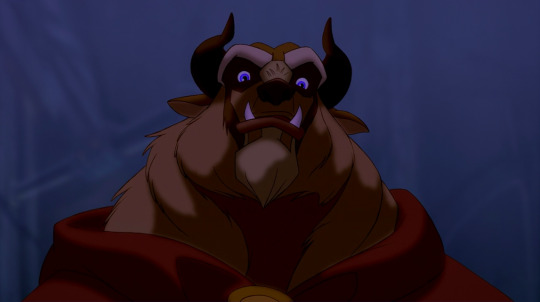
When Belle goes to save the Beast from the village:
« - Please, i know he looks vicious, but he’s really kind and gentle. He’s my friend.
- - [Gaston] If i didn’t know better, I’d think you had feelings for this monster.
- - He’s no monster, Gaston. You are!
- - If you’re not with us, you’re against us. » (pretty similar to the professor’s rage in the hospital)
When Belle’s father goes to save her: « I don’t care what it takes. I’ll find that castle and somehow, i … I’ll get her out of there. » (when Soohyun talks about and to Yohan)
The Beast possessive behavior in the beginning of the story: « [To her father] She’s no longer your concern, take him to the village. » (similar to Yohan’s behavior towards Soohyun) & « [To Belle] The castle is your home now » (and towards Gaon)
A monster:
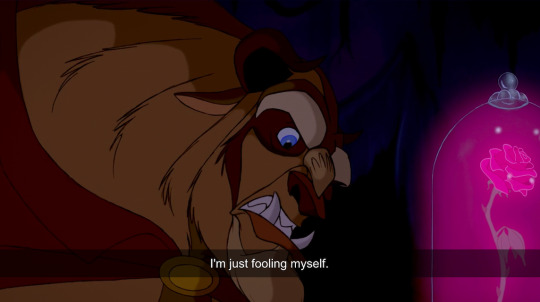


When the Beast observes Belle playing from afar:
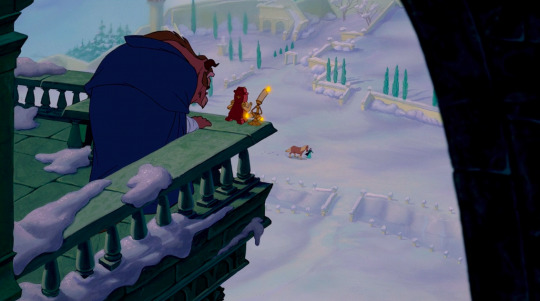

- And i saw some Jane Eyre vibes (SPOILERS) from the whole fire haha + Wuthering Heights on Sun-Ah’s & Yohan’s mixed parts!
- And well … Sun-Ah’s character loosely reminds me of Simone in Nier Automata (which in itself is a reference to Simone de Beauvoir’s life and works), with the whole « I must become more beautiful / But he still won’t look my way », to whoever knows this game!

- These thigh boots holy hell Sun-Ah!!!! i loved this outfit!
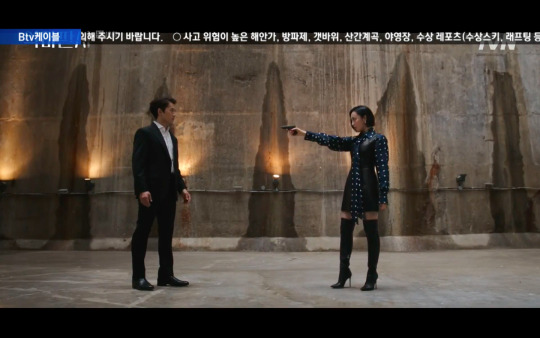
- As soon as he said he didn’t feel anything from his revenge, K got the biggest death flag in this episode, i can’t believe they did this to the poor boy … When i asked for more scenes THIS isn’t what i meant aaaaaaaaaa
- A very random and weird note: Yohan’s almost silent and held back pain by the end of the ep. 12 fits his character so far, as well as his ‘calm’ tears. Given his past, it’s as if he’s always kept his pain bottled up and quietly bears it all and almost never got the space to properly let it all out (he had his brother, but with their father, i think they didn’t have this ‘chance’).
- My sick mind thought Sun-Ah was going to bring Gaon to the scene just in time for him to witness Yohan getting shot, but i guess it will be when she will get in the Kang’s mansion again according to the preview (since she asked Juk Chang for a « favor », i think they’ll knock Gaon out after beating him up for his own fun to leave him to Sun-Ah). Sun-Ah looked surprised when Jae-Hee shot him, so i guess only hurting K was part of the plan.
- The ‘I know i’m fucked’ look hahaha
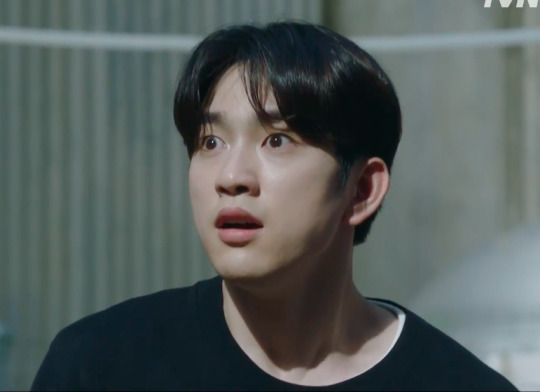
+ the softer version:

- I now have BIG trust issues since these last episodes’ previews, and the cliffhangers kill me haha
- On another note, i find it amazing how Ji Sung and Kim Min Jung keep that upsetting atmosphere whenever there’s a scene between them that involves them and skinship, but it still conveys Sun-Ah’s complex feelings for Yohan and Yohan’s interest in her! The soundtrack really does a good job to convey that mood as well!
- In conclusion: How Dramatic do you want these two episodes to be? The devil judge: Yes
24 notes
·
View notes
Photo
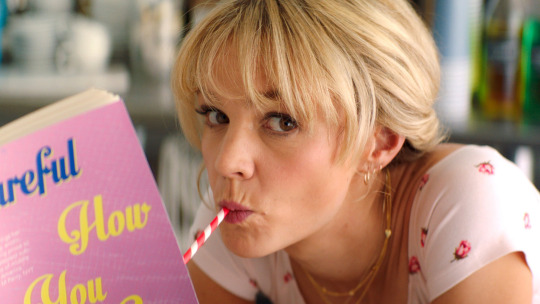
Careful How You Go.
Ella Kemp explores how film lovers can protect themselves from distressing subject matter while celebrating cinema at its most audacious.
Featuring Empire magazine editor Terri White, Test Pattern filmmaker Shatara Michelle Ford, writer and critic Jourdain Searles, publicist Courtney Mayhew, and curator, activist and producer Mia Bays of the Birds’ Eye View collective.
This story contains discussion of rape, sexual assault, abuse, self-harm, trauma and loss of life, as well as spoilers for ‘Promising Young Woman’ and ‘A Star is Born’.
We film lovers are blessed with a medium capable of excavating real-life emotion from something seemingly fictional. Yet, for all that film is—in the oft-quoted words of Roger Ebert—an “empathy machine”, it’s also capable of deeply hurting its audience when not wielded by its makers and promoters with appropriate care. Or, for that matter, when not approached by viewers with informed caution.
Whose job is it to let us know that we might be upset by what we see? With the coronavirus pandemic decimating the communal movie-going experience, the way we accommodate each viewer’s sensibilities is more crucial than ever—especially when so many of us are watching alone, at home, often unsupported.
In order to understand how we can champion a film’s content and take care of its audience, I approached women in several areas of the movie ecosystem. I wanted to know: how does a filmmaker approach the filming of a rape and its aftermath? How does a magazine editor navigate the celebration of a potentially triggering movie in one of the world’s biggest film publications? How does a freelance writer speak to her professional interests while preserving her personal integrity? How does a women’s film collective create a safe environment for an audience to process such a film? And, how does a publicist prepare journalists for careful reporting, when their job is to get eyeballs on screens in order to keep our favorite art form afloat?
The conversations reminded me that the answers are endlessly complex. The concerns over spoilers, the effectiveness of trigger warnings, the myriad ways in which art is crafted from trauma, and the fundamental question of whose stories these are to tell. These questions were valid decades ago, they will be for decades to come, and they feel especially urgent now, since a number of recent tales helmed by female and non-binary filmmakers depict violence and trauma involving women’s bodies in fearless, often challenging ways.
Emerald Fennell’s Promising Young Woman, in particular, has revived a vital conversation about content consideration, as victims and survivors of sexual assault record wildly different reactions to its astounding ending. Shatara Michelle Ford’s quietly tense debut, Test Pattern, brings Black survivors into the conversation. And the visceral, anti-wish-fulfillment horror Violation, coming soon from Dusty Mancinelli and Madeleine Sims-Fewer, takes the rape-revenge genre up another notch.
These films come off the back of other recent survivor stories, such as Michaela Coel’s groundbreaking series I May Destroy You (which centers women’s friendship in a narrative move that, as Sarah Williams has eloquently outlined, happens too rarely in this field). Also: Kata Wéber and Kornél Mundruczó’s Pieces of a Woman, and the ongoing ugh-ness of The Handmaid’s Tale. And though this article is focused on plots centering women’s trauma, I acknowledge the myriad of stories that can be triggering in many ways for all manner of viewers. So whether you’ve watched one of these titles, or others like them, I hope you felt supported in the conversations to follow, and that you feel seen.
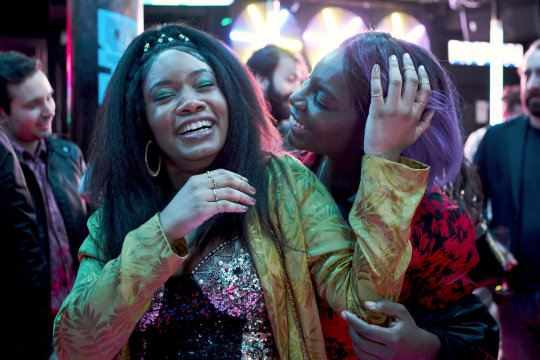
Weruche Opia and Michaela Coel in ‘I May Destroy You’.
* * *
Simply put, Promising Young Woman is a movie about a woman seeking revenge against predatory men. Except nothing about it is simple. Revenge movies have existed for aeons, and we’ve rooted for many promising young (mostly white) women before Carey Mulligan’s Cassie (recently: Jen in Coralie Fargeat’s Revenge, Noelle in Natalia Leite’s M.F.A.). But in Promising Young Woman, the victim is not alive to seek revenge, so it becomes Cassie’s single-minded crusade. Mercifully, we never see the gang-rape that sparks Cassie’s mission. But we do see a daring, fatal subversion of the notion of a happy ending—and this is what has audiences of Emerald Fennell’s jaw-dropping debut divided.
“For me, being a survivor, the point is to survive,” Jourdain Searles tells me. The New York-based critic, screenwriter, comedian—and host of Netflix’s new Black Film School series—says the presence of death in Promising Young Woman is the problem. “One of the first times I spoke openly about [my assault], I made the decision that I didn’t want to go to the police, and I got a lot of judgment for that,” she says. “So watching Promising Young Woman and seeing the police as the endgame is something I’ve always disagreed with. I left thinking, ‘How is this going to help?’”
“I feel like I’ve got two hats on,” says Terri White, the London-based editor-in chief of Empire magazine, and the author of a recently published memoir, Coming Undone. “One of which is me creating a magazine for a specific film-loving audience, and the other bit of me, which has written a book about trauma, specifically about violence perpetrated against the body. They’re not entirely siloed, but they are two distinct perspectives.”
White loved both Promising Young Woman and I May Destroy You, because they “explode the myth of resolution and redemption”. She calls the ending of Promising Young Woman “radical” in the way it speaks to the reality of what happens to so many women. “I was thinking about me and women like me, women who have endured violence and injury or trauma. Three women every week are still killed [in the UK] at the hands of an ex-partner, or somebody they know intimately, or a current partner. Statistically, any woman who goes for some kind of physical confrontation in [the way Cassie does] would end up dying.”
She adds: “I felt like the film was in service to both victims and survivors, and I use the word ‘victims’ deliberately. I call myself a victim because I think if you’ve endured either sexual violence or physical violence or both, a lot of empowering language, as far as I’m concerned, doesn’t reflect the reality of being a victim or a survivor, whichever way you choose to call yourself.” This point has been one many have disagreed on. In a way, that makes sense—no victim or survivor can be expected to speak to anyone else’s experience but their own.

Carey Mulligan and Emerald Fennell on the set of ‘Promising Young Woman’.
Likewise, there is no right or wrong way to feel about this film, or any film. But a question that arises is, well, should everyone have to see a film to figure that out? And should victims and survivors of sexual violence watch this film? “I have definitely been picky about who I’ve recommended it to,” Courtney Mayhew says. “I don’t want to put a friend in harm’s way, even if that means they miss out on something awesome. It’s not worth it.”
Mayhew is a New Zealand-based international film publicist, and because of her country’s success in controlling Covid 19, she is one of the rare people able to experience Promising Young Woman in a sold-out cinema. “It was palpable. Everyone was so engaged and almost leaning forwards. There were a lot of laughs from women, but it was also a really challenging setting. A lot of people looking down, looking away, and there was a girl who was crying uncontrollably at the end.”
“Material can be very triggering,” White agrees. “It depends where people are personally in their journey. When I still had a lot of trauma I hadn’t worked through in my 20s, I found certain things very difficult to watch. Those things are a reality—but people can make their own decisions about the material they feel able to watch.”
It’s about warning, and preparation, more than total deprivation, then? “I believe in giving people information so they can make the best choice for themselves,” White says. “But I find it quite reductive, and infantilizing in some respects, to be told broadly, ‘Women who have experienced x shouldn’t watch this.’ That underestimates the resilience of some people, the thirst for more information and knowledge.” (This point is clearly made in this meticulous, awe-inspiring list by Jenn, who is on a journey to make sense of her trauma through analysis of rape-revenge films.) But clarity is crucial, particularly for those grappling with unresolved issues.
Searles agrees Promising Young Woman can be a difficult, even unpleasant watch, but still one with value. “As a survivor it did not make me feel good, but it gave me a window into the way other people might respond to your assault. A lot of the time [my friends] have reacted in ways I don’t understand, and the movie feels like it’s trying to make sense of an assault from the outside, and the complicated feelings a friend might have.”
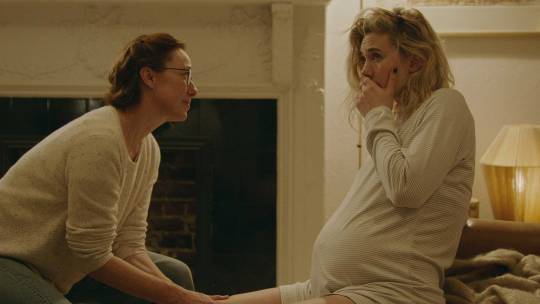
Molly Parker and Vanessa Kirby in ‘Pieces of a Woman’.
* * *
A newborn dies. A character is brutally violated. A population is tortured. To be human is to bear witness to history, but it’s still painful when that history is yours, or something very close to it. “Some things are hard to watch because you relate to them,” Searles explains. “I find mother! hard to watch, and there’s no actual sexual assault. But I just think of sexual assault and trauma and domestic abuse, even though the film isn’t about that. The thing is, you could read an academic paper on patriarchy—you don’t need to watch it on a show [or in a film] if you don’t want to.”
White agrees: “I’ve never been able to watch Nil by Mouth, because I grew up in a house of domestic violence and I find physical violence against women on screen very hard to watch. But that doesn’t mean I think the film shouldn’t be shown—it should still exist, I’ve just made the choice not to watch it.” (Reader, since our conversation, she watched it. At 2:00am.)
“I know people who do not watch Promising Young Woman or The Handmaid’s Tale because they work for an NGO in which they see those things literally in front of their eyes,” Mayhew says. “It could be helpful for someone who isn’t aware [of those issues], but then what is the purpose of art? To educate? To entertain? For escapism? It’s probably all of those.”
Importantly, how much weight should an artist’s shoulders carry, when it comes to considering the audiences that will see their work? There’s a general agreement among my interviewees that, as White says, “filmmakers have to make the art that they believe in”. I don’t think any film lover would disagree, but, suggests Searles, “these films should be made with survivors in mind. That doesn’t mean they always have to be sensitive and sad and declawed. But there is a way to be provocative, while leaning into an emotional truth.”

Madeleine Sims-Fewer in ‘Violation’.
Violation, about which I’ll say little here since it is yet to screen at SXSW (ahead of its March 25 release on Shudder) is not at all declawed, and is certainly made with survivors in mind—in the sense that in life, unlike in movies, catharsis is very seldom possible no matter how far you go to find it. On Letterboxd, many of those who saw Violation at TIFF and Sundance speak of feeling represented by the rape-revenge plot, writing: “One of the most intentionally thought out and respectful of the genre… made by survivors for survivors” and “I feel seen and held”. (Also: “This movie is extremely hard to watch, completely on purpose.”)
“Art can do great service to people,” agrees White, “If, by consequence, there is great service for people who have been in that position, that’s a brilliant consequence. But I don’t believe filmmakers and artists should be told that they are responsible for certain things. There’s a line of responsibility in terms of being irresponsible, especially if your community is young, or traumatised.”
Her words call to mind Bradley Cooper’s reboot of A Star is Born, which many cinephiles knew to be a remake and therefore expected its plot twist, but young filmgoers, drawn by the presence of Lady Gaga, were shocked (and in some cases triggered) by a suicide scene. When it was released, Letterboxd saw many anguished reviews from younger members. In New Zealand, an explicit warning was added to the film’s classification by the country’s chief censor (who also created an entirely new ‘RP18’ classification for the Netflix series 13 Reasons Why, which eventually had a graphic suicide scene edited out two years after first landing on the streaming service).
“There is a duty of care to audiences, and there is also a duty of care to artists and filmmakers,” says Mayhew. “There’s got to be some way of meeting in the middle.” The middle, perhaps, can be identified by the filmmaker’s objective. “It’s about feeling safe in the material,” says Mia Bays of the Birds’ Eye View film collective, which curates and markets films by women in order to effect industry change. “With material like this, it’s beholden on creatives to interrogate their own intentions.”
Filmmaker Shatara Michelle Ford is “forever interrogating” ideas of power. Their debut feature, Test Pattern, deftly examines the power differentials that inform the foundations of consent. “As an artist, human, and person who has experienced all sorts of boundary violation, assault and exploitation in their life, I spend quite a lot of time thinking about power… It is something I grapple with in my personal life, and when I arrive in any workplace, including a film set.”
In her review of Test Pattern for The Hollywood Reporter, Searles writes, “This is not a movie about sexual assault as an abstract concept; it’s a movie about the reality of a sexual assault survivor’s experience.” Crucially, in a history of films that deal largely with white women’s experiences, Test Pattern “is one of the few sexual-assault stories to center a Black woman, with her Blackness being central to her experience and the way she is treated by the people around her.”
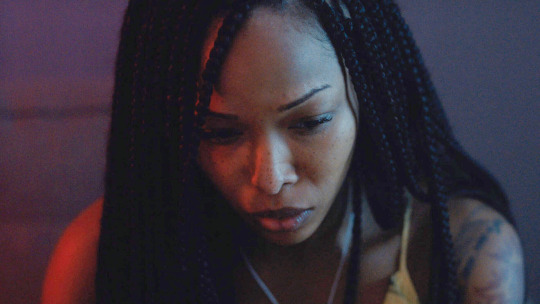
Brittany S. Hall in ‘Test Pattern’.
* * *
Test Pattern follows the unfolding power imbalance between Renesha (Brittany S. Hall) and her devoted white boyfriend Evan (Will Brill), as he drives her from hospital to hospital in search of a rape kit, after her drink was spiked by a white man in a bar who then raped her. Where Promising Young Woman is a millennial-pink revenge fantasy of Insta-worthy proportions, Test Pattern feels all too real, and the cops don’t come off as well as they do in the former.
Ford does something very important for the audience: they begin the film just as the rape is about to occur. We do not see it at this point (we do not really ever see it), but we know that it happened, so there’s no chance that, somewhere deeper into the story, when we’re much more invested, we’ll be side-swiped by a sudden onslaught of sexual violence. In a way, it creates a safe space for our journey with Renesha.
It’s one of many thoughtful decisions made by Ford throughout the production process. “I’m in direct conversation with film and television that chooses to depict violence against women so casually,” Ford tells me. “I intentionally showed as little of Renesha’s rape as humanly possible. I also had an incredibly hard time being physically present for that scene, I should add. What I did shoot was ultimately guided by Renesha’s experience of it. Shoot only what she would remember. Show only what she would have been aware of.
“But I also made it clear that this was a violation of her autonomy, by allowing moments where we have an arm’s length point of view. I let the camera sit with the audience, as I’m also saying, as the filmmaker, this happened, and you saw enough of it to know. This, for me, is a larger commentary on how we treat victims of assault and rape. I do not believe for one goddamn minute that we need to see the actual, literal violence to know what happened. When we flagrantly replicate the violence in film and television, we are supporting the cultural norm of needing ‘all of the evidence’—whatever that means—to ‘believe women’.”
Ford’s intentional work in crafting the romance and unraveling of Test Pattern’s leading couple pays off on screen, but their stamp as an invested and careful director also shows in their work with Drew Fuller, the actor who played Mike, the rapist. “It’s a very difficult role, and I’m grateful to him for taking it so seriously. When discussing and rendering the practice and non-practice of consent intentionally, I found it helpful to give it a clear definition and provide conceptual insight.
“I sent Drew a few articles that I used as tools to create a baseline understanding when it comes to exploring consent and power on screen. At the top of that list was Lili Loofbourow’s piece, The female price of male pleasure and Zhana Vrangalova's Teen Vogue piece, Everything You Need to Know about Consent that You Never Learned in Sex Ed. The latter in my opinion is the linchpin. There’s also Jude Elison Sady Doyle’s piece about the whole Aziz Ansari thing, which is a great primer.”

Sidney Flanigan in ‘Never Rarely Sometimes Always’.
Even when a filmmaker has given Ford’s level of care and attention to their project, what happens when the business end of the industry gets involved in the art? As we well know, marketing is a film’s window dressing. It has one job: to get eyeballs into the cinema. It can’t know if every viewer should feel safe to enter.
It would be useful, with certain material, to know how we should watch, and with whom, and what might we need in the way of support coming out. Whose job is it to provide this? Beyond the crude tool of an MPAA rating (and that’s a whole sorry tale for another day), there are many creative precautions that can be taken across the industry to safeguard a filmgoer’s experience.
Mayhew, who often sees films at the earliest stages (sometimes before a final cut, sometimes immediately after), speaks to journalists in early screenings and ensures they have the tools to safely report on the topics raised. In New Zealand, reporters are encouraged to read through resources to help them guide their work. Mayhew’s teams would also ensure journalists would be given relevant hotline numbers, and would ask media outlets to include them in published stories.
“It’s not saying, ‘You have to do this’,” she explains, “It’s about first of all not knowing what the journalist has been through themselves, and second of all, [if] they are entertainment reporters who haven’t navigated speaking about sexual assault, you only hope it will be helpful going forward. It’s certainly not done to infantilize them, because they’re smart people. It’s a way to show some care and support.”
The idea of having appropriate resources to make people feel safe and encourage them to make their own decisions is a priority for Bays and Birds’ Eye View, as well. The London-based creative producer and cultural activist stresses the importance of sharing such a viewing experience. “It’s the job of cinemas, distributors and festivals to realize that it might not be something the filmmaker does, but as the people in control of the environment it’s our job to give extra resources to those who want it,” says Bays. “To give people a safe space to come down from the experience.”
Pre-pandemic, when Birds’ Eye View screened Kitty Green’s The Assistant, a sharp condemnation of workplace micro-aggressions seen through the eyes of one female assistant, they invited women who had worked for Harvey Weinstein. For a discussion after Eliza Hittman’s coming-of-ager Never Rarely Sometimes Always, abortion experts were able to share their knowledge. “It’s about making sure the audience knows you can say anything here, but that it’s safe,” Bays explains. “It’s kind of like group therapy—you don’t know people, so you’re not beholden to what they think about you. And in the cinema people aren’t looking at you. You’re speaking somewhat anonymously, so a lot of really important stuff can come out.”
The traditional movie-going experience, involving friends, crowds and cathartic, let-loose feelings, is still largely inaccessible at the time of writing. Over the past twelve months we’ve talked plenty about preserving the magic of the big screen experience, but it’s about so much more than the romanticism of an art form; it’s also about the safety that comes from a feeling of community when watching potentially upsetting movies.
“The going in and coming out parts of watching a film in the cinema are massively important, because it’s like coming out of the airlock and coming back to reality,” says Bays. “You can’t do that at home. Difficult material kind of stays with you.” During the pandemic, Birds’ Eye View has continued to provide the same wrap-around curatorial support for at-home viewers as they would at an in-person event. “If we’re picking a difficult film and asking people to watch it at home, we might suggest you watch it with a friend so you can speak about it afterwards,” Bays says.
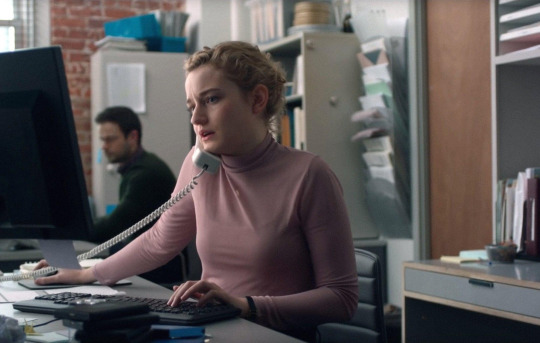
Julia Garner in ‘The Assistant’.
But, then, how can we still find this sense of community without the physical closeness? “It’s no good waiting for [the internet] to become kind,” she says. “Create your own closed spaces. We do workshops and conversations exclusively for people who sign up to our newsletter. In real-life meetings you can go from hating something to hearing an eloquent presentation of another perspective and coming round to it, but you need the time and space to do that. This little amount of time gives you a move towards healing, even if it’s just licking some wounds that were opened on Twitter. But it could be much deeper, like being a survivor and feeling very conflicted about the film, which I do.”
Conflict is something that Searles, the film critic, knows about all too well in her work. “Since I started writing professionally, I almost feel like I’m known for writing about assault and rape at this point. I do write about it a lot, and as a survivor I continue to process it. I’ve been assaulted more than once so I have a lot to process, and so each time I’m writing about it I’m thinking about different aspects and remnants of those feelings. It can be very cathartic, but it’s a double-edged sword because sometimes I feel like I have an obligation to write about it too.”
There is also a constant act of self-preservation that comes with putting so much of yourself on the internet. “I often get messages from people thanking me for talking about these subjects with a deep understanding of what they mean,” Searles says. “I really appreciate that. I get negative messages about a lot of things, but not this one thing.”

Michaela Coel in ‘I May Destroy You’.
* * *
With such thoughtful approaches to heavy content, it feels like we’re a long way further down the road from blunt tools like content and trigger warnings. But do they still have their place? “It’s just never seemed appropriate to put trigger warnings on any of our reviews or features,” White explains. “We have a heavy male readership, still 70 percent male to 30 percent female. I’m conscious we’re talking to a lot of men who will often have experienced violence themselves, but we don’t put any warnings, because we are an adult magazine, and when we talk about violence in, say, an action film, or violence that is very heavily between men, we don’t caveat that at all.”
Bays, too, is sceptical of trigger warnings, explaining that “there’s not much evidence [they] actually work. A lot of psychologists expound on the fact that if people get stuck in their trauma, you can never really recover from PTSD if you don’t at some point face your trauma.” She adds: “I’m a survivor, and I found I May Destroy You deeply, profoundly triggering, but also cathartic. I think it’s more about how you talk about the work, rather than having a ‘NB: survivors of sexual abuse or assault shouldn’t see this’.”
“It’s important to give people a feel of what they’re in for,” argues Searles. “A lot of people who have dealt with suicide ideation would prefer that warning.” While some worry that a content warning is effectively a plot spoiler, Searles disagrees. “I don’t consider a content warning a spoiler. I just couldn’t imagine sitting down for a film, knowing there’s going to be a suicide, and letting it distract me from the film.” Still, she acknowledges the nuance. “I think using ‘self-harm’ might be better than just saying ‘suicide’.”
Mayhew shared insights on who actually decides which films on which platforms are preceded with warnings—turns out, it’s a bit messy. “The onus traditionally has fallen on governmental censorship when it comes to theatrical releases,” she explains. “But streamers can do what they want, they are not bound by those rules so they have to—as the distributors and broadcasters—take the government’s censors on board in terms of how they are going to navigate it.
“The consumer doesn’t know the difference,” she continues, “nor should they—so it means they can be watching The Crown on Netflix and get this trigger warning about bulimia, and go to the cinema the next day and not get it, and feel angry about it. So there’s the question of where is the responsibility of the distributor, and where is the responsibility of the audience member to actually find out for themselves.”
The warnings given to an audience member can also vary widely depending where they find themselves in the world, too. Promising Young Woman, for example, is rated M in Australia, R18 in New Zealand, and R in the United States. Meanwhile, the invaluable Common Sense Media recommends an age of fifteen years and upwards for the “dark, powerful, mature revenge comedy”. Mayhew says a publicist’s job is “to have your finger on the pulse” about these cultural differences. “You have to read the overall room, and when I say room I mean the culture as a whole, and you have to be constantly abreast of things across those different ages too.”
She adds: “This feeds into the importance of representation right at the top of those boardrooms and right down to the film sets. My job is to see all opinions, and I never will, especially because I am a white woman. I consider myself part of the LGBT community and sometimes I’ll bring that to a room that I think has been lacking in that area, when it comes to harmful stereotypes that can be propagated within films about LGBT people. But I can’t bring a Black person’s perspective, I cannot bring an Indigenous perspective. The more representation you have, the better your film is going to be, your campaign is going to be.”
Bays, who is also a filmmaker, agrees: representation is about information, and working with enough knowledge to make sure your film is being as faithful to your chosen communities as possible. “As a filmmaker, I’d feel ill-informed and misplaced if I was stumbling into an area of representation that I knew nothing about without finding some tools and collaborators who could bring deeper insight.”

Carey Mulligan and Bo Burnham in ‘Promising Young Woman’.
This is something Ford aimed for with Test Pattern’s choice of crew members, which had an effect not just on the end product, but on the entire production process. “I made sure that at the department head level, I was hiring people I was in community with and fully saw me as a person, and me them,” they say. “In some ways it made the experience more pleasurable.” That said, the shoot was still not without its incidents: “These were the types of things that in my experience often occur on a film set dominated by straight white men, that we're so accustomed to we sometimes don’t even notice it. I won’t go into it but what I will say is that it was not tolerated.”
Vital to the telling of the story were the lived experiences that Ford and their crew brought to set. “As it applies to the sensitive nature of this story, there were quite a few of us who have had our own experiences along the spectrum of assault, which means that we had to navigate our own internal re-processing of those experiences, which is hard to do when we’re constructing an experience of rape for a character.
“However, I think being able to share our own triggers and discomfort and context, when it came to Renesha’s experience, made the execution of it all the better. Again, it was a pleasure to be in community with such smart, talented and considerate women who each brought their own nuance to this film.”
* * *
Thinking about everything we’ve lived through by this point in 2021, and the heightened sensitivity and lowered mental health of film lovers worldwide, movies are carrying a pretty heavy burden right now: to, as Jane Fonda said at the Golden Globes, help us see through others’ eyes; also, to entertain or, at the very least, not upset us too much.
But to whom does film have a responsibility, really? Promising Young Woman’s writer-director Emerald Fennell, in an excellent interview with Vulture’s Angelica Jade Bastién, said that she was thinking of audiences when she crafted the upsetting conclusion.
What she was thinking was: a ‘happy’ ending for Cassie gets us no further forward as a society. Instead, Cassie’s shocking end “makes you feel a certain way, and it makes you want to talk about it. It makes you want to examine the film and the society that we live in. With a cathartic Hollywood ending, that’s not so much of a conversation, really. It’s a kind of empty catharsis.”
So let’s flip the question: what is our responsibility, as women and allies, towards celebrating audacious films about tricky subjects? The marvellous, avenging blockbusters that once sucked all the air out of film conversation are on pause, for now. Consider the space that this opens up for a different kind of approach to “must-see movies”. Spread the word about Test Pattern. Shout from the rooftops about It’s A Sin. Add Body of Water and Herself and Violation to your watchlists. And, make sure the right people are watching.
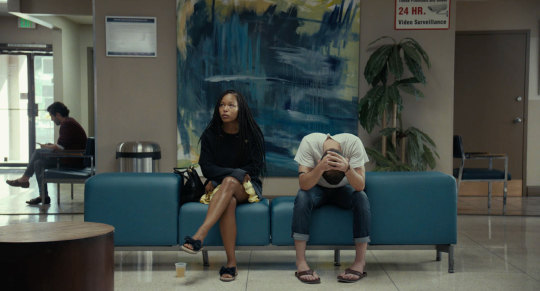
Brittany S. Hall and Will Brill in ‘Test Pattern’.
I asked my interviewees: if they could choose one type of person they think should see Promising Young Woman, who would it be? Ford has not seen Fennell’s film, but “it feels good to have my film contribute to a larger discourse that is ever shifting, ever adding nuance”. They are very clear on who can learn the most from their own movie.
“A white man is featured so prominently in Test Pattern as a statement about how white people and men have a habit of centering themselves in the stories of others, prioritizing their experience and neglecting to recognize those on the margins. If Evan is triggering, he should be. If your feelings about Evan vacillate, it is by design.
“‘Allies’ across the spectrum are in a complicated dance around doing the ‘right thing’ and ‘showing up’ for those they are ostensibly seeking to support,” Ford continues. “Their constant battle is to remember that they need to be centering the needs of those they were never conditioned to center. Tricky stuff. Mistakes will be made. Mistakes must be owned. Sometimes reconciliation is required.”
It is telling that similar thoughts emerged from my other interviewees regarding Promising Young Woman’s ideal audience, despite the fact that none of them was in conversation with the others for this story. For that reason, as we come to the end of this small contribution to a very large, ongoing conversation, I’ve left their words intact.
White: I think it’s a great film for men.
Searles: I feel like the movie is very much pointed at cisgender heterosexual men.
Mayhew: Men.
White: We’re always warned about the alpha male with a massive ego, but we’re not warned about the beta male who reads great books, listens to great records, has great film recommendations. But he probably slyly undermines you in a completely different way. Anybody can be a predator.
Searles: The actors chosen to play these misogynist, rape culture-perpetuating men are actors we think of as nice guys.
White: We are so much more tolerant of a man knocking the woman over the head, dragging her down an alley and raping her, because we understand that. But rape culture is made up of millions of small things that enable the people who do it. We are more likely to be attacked in our own homes by men we love than a stranger in the street.
Mayhew: The onus should not fall on women to call this out.
Searles: It’s not just creeps, like the ones you see usually in these movies. It’s guys like you. What are you going to do to make sure you’re not like this?
Related content
Sex Monsters, Rape Revenge and Trauma: a work-in-progress list
Rape and Revenge: a list of films that fall into, and play with, the genre
Unconsenting Media: a search engine for sexual violence in broadcasting
Follow Ella on Letterboxd
If you need help or to talk to someone about concerns raised for you in this story, please first know that you are not alone. These are just a few of the many organizations and resources available, and their websites include more information.
US: RAINN (hotline 0800 656 HOPE); LGBT National Help Center; Pathways to Safety; Time’s Up.
Canada: Canadian Association of Sexual Assault Centers—contacts by province and territory
UK/Ireland: Mind; The Survivors Trust (hotline 08088 010818); Rape Crisis England and Wales
Europe: Rape Crisis Network Europe
#promising young woman#violation#emerald fennell#carey mulligan#ella kemp#shatara michelle ford#test pattern#women directors#female director#directed by women#non binary director#non binary filmmaker#lgbt#trigger#trigger warning#content warning#censorship#empire magazine#letterboxd#empire online#terri white#courtney mayhew#film publicity#film marketing#birds eye view
47 notes
·
View notes
Text
TODD HEADCANON + BEFRIENDING THE ‘LITTLE GUYS’
general. okay so i know I’ve spoken on this privately with people, but Todd is one of those people (both as the Fox and as himself) who befriends the people in bad situations very easily and very quickly. This is especially true in his current/most recent verse, so i’m going to talk about this.
vulnerable. Todd connects very quick with the vulnerable populations. The homeless, children, women, etc. This is just in his nature as he knows that in some way he can be a protector to these people if they need it. He offers his smiles, his spare change, his friendship, his loyalty, his personality, his everything to these people the closer and closer they get. While Todd might be closed off with the people who are privileged in life or have had little hardship, Todd is far more open with the people who are in dire situations. He likes being called upon, he likes assuming that role of protector, provider, or even helper when he’s able to.
homeless. because Todd himself spent from age 8-15 homeless, Todd connects very quickly with the homeless population where ever he is living. He’s the kind of person who when he sees a homeless person while he’s waiting for a cross walk light to turn green, he’ll lean up against whatever is closest to the person and strike up a conversation. He shakes hands, compliments them, introduces himself. He never forgets a face either, so it’s not uncommon to see him waving to someone and asking them how they’re doing or if they need anything. He doesn’t infantilize the homeless either like many people do –– in short, he treats them like normal, healthy people. he’s the kind of guy who doesn’t just give the homeless his left overs from a restaurant, but will buy a full meal to go for himself and for the other person and sit down and strike up a conversation about their life together. He is also known to give away some of his old clothes to his homeless friends casually, give them gifts for their birthdays and holidays and stuff. Todd gives his phone number out generously to homeless people he knows, letting them know he’s a safe place to come and talk to or to come to him if they need anything. if you’re with him out and about, expect to be delayed going anywhere if he sees homeless people he knows. He’ll introduce you to them, make small talk, and carry on as if he was talking to an old friend. Because to Todd, he doesn’t make the distinction between someone being homeless or not and being his friend. They are his friends by default.
subnote on the homeless. Todd/The Fox’s main enemy and villain is a name named Sebastian who uses, abuses, and manipulates the homeless population to do his bidding. Todd (as the Fox) has come across his friends beaten, abused, or even dead at the hands of Sebastian. It’s Todd’s innate understanding of just how vulnerable the homeless population that sets him on the track of hunting down Sebastian. Even if Todd never meets Sebastian, the Fox and Todd both serve as protectors for this type of vulnerable people which is WHY politicians hate The Fox.
children. Todd loves children, and having been a child who has experienced a serious amount of abuse and neglect, he notices those things in children very quickly. Even children he knows are well cared for, he often times becomes unbelievably protective of them. He’s known to strike up conversations with children while their parents are there and while they’re not. He knows sometimes it comes off the wrong way, but really he just enjoys making sure their okay and checking up on them. He also does not infantilize children at all, and tends to swear around them without realizing it too much. Most kids really like him, and he takes a vested interest in the children of his friends and family. He knows first hand how someone can make a situation look okay from the outside when really there is trouble at home. He trusts his friends and his family, but that skeptical part of him is always making sure the children in his life are okay.
women. Todd for awhile had a very complicated relationship with woman, but has since gotten over that and invested himself in the woman in his life. He will, and has, gotten revenge on behalf of women who have been wronged. He has a deep and vested understanding of what women face, even if he has never experienced it, he’s seen in while living on the streets. It’s a haunting thing to see, so he tends to put a lot of weight on a woman’s word far more than a man. as with everyone, he’s a skeptic of people’s true intentions a lot of the time, but he’s heard and seen his fair share of awful done to woman to feel an emboldened need to be their champion in dire situations. He is not under the impression that woman are helpless and need to be protected, but he is well aware of his abilities and privileges as not only a man, but as a masked vigilante to be able to serve up revenge or justice on their behalf.
final thoughts. i could go on and on about the many vulnerable types of people todd is protective over, but really what it boils down to is that he favours the people who have to fight a million times harder for everything in their lives, BECAUSE HE RELATES TO THEM. they’re the people he will befriend, they’re the people he will fight for, they’re the people that motivate him to put on that fox mask and try to do some fucking good even though morally he generally is more neutral. He cares about making THEIR world better, and no one else’s. I’m going to end this here before I get too lengthy, but this goes hand in hand with Todd’s distain for the rich and wealthy which I’ve talked about here.
#( this is a heavy one but it needed to get out there )#todd rebane ( general ).#todd rebane ( headcanon ).#abuse mention tw#homelessness mention tw
2 notes
·
View notes
Note
I am continually baffled by some of the MCU casting choices tbh and have been since the beginning. Like, they keep casting men in their 30s-40s, even for characters who aren’t that old! RDJ, Ruffalo, Renner, Pratt, Rudd (even though I love him), Bettany, Cumberbatch, etc and I don’t get why?? Like the MCU is supposed to be a long running franchise, wouldn’t you want to use younger talent so you’d be able to keep using them for longer? Also the fact that so many of the men are older while the women are not is creepy to me
This is somewhat long so it goes under a cut.
For Tony and Bruce, their age factors into their character to a certain extent in that they aren’t teenagers or young adults or really old guys. With Tony I could see him being played by someone in their late 20′s to early 40′s and it would still work although I think ideally someone in their 30′s would work. Ditto for Bruce. Scott is a dad and yeah someone in their mid 20′s to early 40′s (depending on Cassie’s age) is also acceptable to me.
Star-Lord at the least in Annihilation felt to me like he was an older guy the way he was portrayed there. I felt like he was in his 30′s but if you’re going to start out with the character then yeah I would have gotten someone in their 20′s especially with the attitude he has in the movies (but I guess him having psychological arrested development from his trauma with his mother’s death was something Gunn wanted to touch on his character. I just wish the MCU would have Peter address that trauma and have him be able to be at peace with his mother’s death).
I am not even going to try to make sense of Stephen Strange’s age in the comics but him and Reed where always depicted as older men with greying temples so an actor in their mid to late 30′s or 40′s fits them too.
I could never see Renner as Clint Barton mainly because the Clint I like is 616 Clint and it’s obvious when MCu Clint debuted that they were going for an adaptation of Ultimate Hawkeye (he’s a SHIELD agent former assassin and he has a wife and kids) so them trying to make him into Fraction Hawkeye is kind of funny to me. But seeing how 616 Clint was immature, brash, hot tempered, and pretty green I think and actor in his 20′s would work. Ultimate Hawkeye on the other hand that was a totally different character form 616 Clint so I really don’t care and MCU Clint is just his own thing inspired by the Ultimate version so whatever.
Rich is a character that debuted as a teenager and currently in the comics he’s a young adult, he refers to characters like Tony and Cap as Mr. or Sir and characters like Ben Grimm still refer to him as kid. There’s also a youth element to him and a lot of his stories, even Annihilation, which involve him growing as a hero. He’s also is immature in some aspects and at times can even be childish and bullheaded and has traits that on an older person would be seen as unbecoming (and even then this character is more responsible than other heroes). I also feel characters like Johnny Storm would also need to be played by a young actor, same goes for Adam Warlock (and they also get fancasted with guys who are way too old to play them).
Peter Parker at his core is also young and despite Marvel’s obsession with him being a teen his best stories have been when he was a young adult in college (which I think is the perfect age for him also because he’s allowed to be more independent and there’s less of a chance of him getting infantilized). Yet I feel that he relies on that youth less than the other characters not to mention people have seen his origin story enough times and know that character by heart that you can do other stories with him being older and still have them work. the Spider-Verse movie did it and it worked great there, also Spider-Girl and ASM: Renew Your Vows has him being a father and it really works because Spidey is definitely dad material.
Yeah with female characters, especially in action flicks, movies love casting women in their early 20′s and pairing them up with guys who are significantly older (see Widow and Bruce or Wanda and Vision). There are some exceptions like Evangeline Lily who was 36 when she was cast as Hope but she’s still younger than Rudd. You never see it happening the other way around.
Heck even in comics you had people bitching at the fact that Steve Rogers was in a relationship with a significantly older Sharon Carter but they didn’t mind it when he was in his grandpa stage.
9 notes
·
View notes
Text


Please read my blog’s “about” before responding to this post.
The reblog in this screenshot was a response to a post made by a transfem expressing exasperation with being spoken over by TMEs, and I think it illustrates a very blasé attitude towards transmisogyny I’ve seen crop up a few times, so I thought I’d explain it here.
“I’m not transfem, but I still understand how serious of an issue this is. I’ve experienced misogyny just because I’m AFAB.”
Right off the bat, this person is directing attention away from the topic at hand to focus on their own experiences. Misogyny and transmisogyny may be similar in many ways, but experiencing misogyny in no way gives a person special insight into what it’s like to be transfem.
Furthermore, this is a highly bioessentialist claim and sounds suspiciously similar to the TERF talking point of “sex-based oppression.” People don’t experience misogyny because they’re AFAB. Trans women experience misogyny while passing trans men don’t.
“The fact that you’re bringing that negativity into a community that is about loving who you love and being who you are is ridiculous. Transmisogyny is ridiculous.”
Now this person is clearly contradicting their initial statement by demonstrating that they absolutely do not understand just how serious transmisogyny is. They liken it to a form of intracommunity “negatively” akin to rudeness or name-calling, rather than the extremely violent and traumatizing form of oppression it actually is. Transmisogyny is not “ridiculous.” It’s deadly.
“This goes back to basic respect you learn at 5 years old: treat others the way you want to be treated.”
So, here’s an interesting point that I rarely see brought up when discussing how oppressive systems are downplayed: What this comment does is basically infantilize transmisogynists, reducing their transmisogyny to immaturity (and propping the author up as morally superior by association). They claim that people learn not to bully others in kindergarten (although, of course, transmisogyny is not just interpersonal), when, in reality, most kids are learning by this age, whether implicitly or explicitly, that “girly boys” deserve to be bullied. Almost as if transmisogyny is a pervasive cultural attitude of disgust towards transfemininity and anyone who embodies even a close approximation of it. Almost.
“Everyone in the LGBTQ+ community knows how hard it is for us because people love to hate on us based off of our sexualities, presentations, genders, and any other non-cisheteronormative identity in this community. Why would we bring that hate inside the community?”
Once again, they’re shifting the focus off of the intracommunity transmisogyny which transfems face, and onto the other members of the community. I know their intention is to say, “Why should you be bigoted when you face bigotry yourself?” but because they frame it as little more than being bullied by outside members of the community, it really undercuts their point.
The way this person talks about systems of bigotry is legitimately concerning, and I have to wonder if they even understand what oppression means, given that they describe cisheterosexism as bigots “hating on” our community.
I just want to point out how peculiar it is that they know of the concept of cisheteronormativity, but they don’t seem to fully grasp what it means beyond the level of interpersonal bigotry, despite the fact that cisheteronormativity is literally the name for the cultural institution by which cishet experiences are prioritized and non-cishet experiences are marginalized. How do you have the jargon without any of the substance? It’s mostly irrelevant, but still really baffling.
“Either learn to treat every member of this community with respect, or stop saying you’re an ally or you’re part of the LGBTQ+ community.”
Again, this person is trying to refocus the conversation to be about inclusivity and combating “negativity” within the whole community, when the original post was specifically about transmisogyny. At this point, this person is just derailing the post in order to avoid actually engaging with the transmisogyny prevalent within the community. I can only assume based on the first statement in this reblog that this is an attempt, perhaps not to outright deny their complicity, but certainly to elude discussing it.
“Racism exists in this community, and it disgusts me.”
There is absolutely a place in this conversation to discuss how racism interacts with transmisogyny — trans women of color, especially Black trans women, are the most vulnerable members of the community and the most likely to be killed in an act of bigoted violence — but, again, this is taking the focus off of the experiences of TWOC and making it about the entire community for no real reason other than to avoid critically engaging with the part LGBTQ+ TMEs play in transmisogynistic oppression.
This point also serves to further demonstrate how little an understanding this person seems to have about oppression. There’s only so many times I can say “It’s pervasive and systemic” before those words start to lose all meaning, but it’s still true: Racism exists in every community because it is built into the foundation of our wider culture. Obviously, racism is present in the communities it oppresses (oppressed classes cannot ever truly escape their oppression), but it is also present in the privileged class, in the form of implicit bias and outright bigotry. This is what it means for oppression to be institutionalized: racism is an inescapable cultural force. Of course it’s present in the LGBTQ+ community, and we white people must be actively fighting to dismantle it within ourselves and within our individual communities. Being ignorant of or unable to understand that fact evinces a fundamental misunderstanding of how white supremacist oppression works.
Conclusion:
I know this is a rather extreme example of someone who clearly has some more research to do about institutionalized systems of oppression, but hopefully it can help to clearly illustrate to you all just how important it is to recognize the reality of transmisogyny. You may be thinking, “Well, I’m not like this person. I understand transmisogyny is more than just interpersonal instances of bigotry, so I must be in the clear here”; but I implore you to do a little more introspection and really consider how it is you think about transmisogyny and your relationship to it. Do you truly understand it as a pervasive cultural force for demonizing transfemininity and anything in proximity to it? More importantly, how do you express this with your actions and in your form of allyship to transfems? Next time you see a transfem pointing out an example of transmisogyny and you start to think, “That’s ridiculous. This is a perfectly normal thing. How could it be transmisogynistic?” take a step back and reassess. Do you really believe the legitimacy of systemic transmisogyny, or do you just not want to let go of the fundamentally transmisogynistic ideals you’ve held for so long? Are you aware of the part you play in transmisogynistic oppression, or do you brush it off as something which only ignorant bigots participate in?
Please read my blog’s “about” before responding to this post.

#allyship#dogwhistles#erasure#performative allyship#transfem exclusion#transmisogyny#anti transmisogyny#transfeminism#feminism#tme#tma#lgbt#lgbtq#trans woman#transfeminine#educational resource#ask to tag
9 notes
·
View notes
Text
ToastedTHG: Does Katniss (protectively) infantilize Prim?
[I may revisit this post later in light of CF and MJ, but it’s ridiculously long already and I really want to stick with THG for the moment.]
I don’t mean this as harshly as it sounds, simply that, to my way of thinking, Katniss depicts - and likely perceives - Prim, especially early on in THG, as a much younger child. I find with older siblings (my own sister and friends that have little sisters), the younger sibling sometimes gets “stuck” in their head at a certain age/stage, and it stands to reason that Prim would be locked in Katniss’s mind by the trauma of Mr. Everdeen’s death, Mrs. Everdeen’s neglect, and the girls’ near-death by starvation as seven-year-old “sweet tiny Prim, who cried when I cried before she even knew the reason.”
When I first started reading THG fic, it bothered me that Prim always came across as so much younger than she’s supposed to be (though I found myself doing the same with her character when I first started writing THG fic). She always seemed to be about eight years old, whether Katniss was twelve or eighteen. And then I went back to THG and really looked at how Katniss presents her:
She must have had bad dreams and climbed in with our mother.
My little sister, Prim, curled up on her side, cocooned in my mother’s body, their cheeks pressed together.
The community home would crush her like a bug.
Even at home, where I am less pleasant, I avoid discussing tricky topics. [...] Prim might begin to repeat my words and then where would we be?
I reach out to Prim and she climbs on my lap, her arms around my neck, head on my shoulder, just like she did when she was a toddler.
“She’s just twelve.” (not that age twelve isn’t still childhood, but this reads to me like “She’s just seven years old...”)
The woods terrified her...
...Prim, who’s scared of her own shadow...
In this way [Rue’s] exactly the opposite of Prim, for whom adventures are an ordeal.
I’m not suggesting that any of this is negative or untrue, and as I’ll explain in just a moment, as the story goes on, Katniss paints quite a different picture of her sister between the lines. But as I revisited each of these passages (not to mention the “little duck” references on reaping day), I couldn’t help feeling that Katniss is still seeing and describing a sweet, frail, starving seven-year-old. And it’s not hard to see why.
I protect Prim in every way I can, but I’m powerless against the reaping. The anguish I always feel when she’s in pain wells up in my chest and threatens to register on my face.
Katniss is an exemplary protective older sister - the only thing she wanted in all of this is to protect Prim :_( - and I would never find fault with her depicting Prim as a tiny frightened thing who needs shielding from the world at all times. But there’s a whole lot more to Prim that her sister eventually lets slip out (intentionally or otherwise):
Sweet tiny Prim...who brushed and plaited my mother’s hair before we left for school, who still polished my father’s shaving mirror each night because he’d hated the layer of coal dust that settles on everything in the Seam. (This is that same tiny vulnerable seven-year-old taking care of her adult mother and tending to her dead father’s memory - every single day, even while she’s starving to death! I can’t think of anything I did that consistently at age seven, let alone taking care of another person!)
On the table, under a wooden bowl to protect it from hungry rats and cats alike, sits a perfect little goat cheese wrapped in basil leaves. Prim’s gift to me on reaping day. (As @ghtlovesthg pointed out - this means Prim must have been up before Katniss!)
“I’ll be all right, Katniss,” says Prim, clasping my face in her hands. “But you have to take care, too. You’re so fast and brave. Maybe you can win.” (Prim reassuring Katniss at the Justice Building! I’d forgotten about that one!)
...When she sells her goat cheeses at the Hob... (Prim is a businesswoman, not just a sometime-trader! Discussed a smidge more in this post.)
Prim milking her goat before school. (Again, uniquely responsible in a child, because this is an every-single-day responsibility, not something you can skip if you sleep in or rush if you’re running late. At least, not if I understand milking correctly.)
What’s funny was, Prim, who’s scared of her own shadow, stayed and helped. (With that miner’s awful leg wound)
That’s another thing about my mother and Prim. Nakedness has no effect on them, gives them no cause for embarrassment. Ironically, at this point in the Games, my little sister would be of far more use to Peeta than I am. (I’m almost 40 and I’m still squeamish about male nudity! It’s part of why I love Katniss so much! And I love Katniss’s admission of sweet, tiny, vulnerable Prim being useful to a mortally wounded Peeta.)
Something that’s only faintly nodded to (and that in CF) is that Prim has been dealing firsthand with pregnancy/labor/delivery, probably alongside her mother - I’d hazard she’s something of an apothecary apprentice at this point - but certainly with Lady, her goat. Lady was a gift for Prim’s 10th birthday (just over two years before THG begins), which means she’s been tended by Prim through at least two pregnancies, as well as the mauled shoulder. I belabored this a bit in WtM, but this also means that Prim had a small side business in goat kids, either trading them back to the Goat Man for the stud service that keeps Lady in milk, selling male kids to Rooba for meat (which would probably break Prim’s tender heart a bit), and/or selling females for a tidy sum as future dairy goats.
What’s more, if Prim hasn’t gone through menarche herself by the start of THG, she’s surely intimately aware of it (between close living quarters, limited “sanitary supplies,” and her mother’s patients). This is something else I’ve touched on (and will belabor in the near future) in the Mooniverse, but I think menstruation was both a hopeful and a terrifying thing to the women of Twelve. (On the one hand, they would certainly experience irregular/absent periods, delayed menarche, etc due to malnutrition, so the appearance of a steady cycle would mean joy for those who dearly wanted to get pregnant, but there would also be something of Katniss’s “terror as old as life itself” at the prospect of those children who might result.) We never get a chance to see this, sadly, but I’ll bet Prim had a crush (on Peeta’s oldest brother, who was crazy about her in turn). Did she share Katniss’s fear about bringing children into the cruel world she lived in, or was she looking forward to being a mother one day?
To wrap this up, for a little perspective, let’s take a quick peek at another example of a twelve-year-old female character. Say, an intelligent one with an ugly yellow cat...
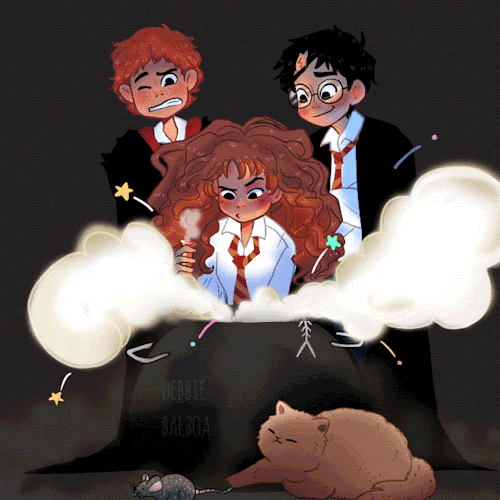
(yes, I know Crookshanks comes along a smidge later, but I’m not crazy about movie!Hermione and this gif was too perfect!)
At the beginning of THG, give or take a few months, Prim is the same age as Hermione in Harry Potter and the Chamber of Secrets.

Please tell me this gives someone else a wee start (and I don’t mean the gif of Captain Kirk)!
Now, I’m not trying to equate these characters by any means, though there are similarities between the two (and I’ve been wondering for days now: if Prim was Hermione, Rory Hawthorne would be Ron, for so many reasons, but who would be Harry??)...The Grangers are dentists, Mrs. Everdeen is a skilled apothecary; both girls have a heritage looked down upon by some of their peers (though it’s interesting that, at least from Katniss’s perspective, Prim is universally adored rather than scorned as a “Seam brat” - and she’s got to look the tiniest bit Seam in some way!). I would hazard that Prim knows the plant book cover-to-cover at this point - and heck, Katniss even describes Prim (and their mother) as “work[ing] magic” in their healing! :)
I freely admit that Hermione had loads of advantages Prim could only dream of (relative affluence in the Muggle world, 20th-21st century conveniences, access to superior education from the get-go, not to mention real magic), but one would expect - and I think, will find - a similar emotional maturity in Prim at that age, if not more weighted to Prim's side, since she's living in a brutal post-apocalyptic dystopia where she lost her father (in terrible circumstances) at a very young age and works alongside her mother to tend sick/wounded/dying coal miners - surely a harrowing experience for even a seasoned healer.
Anyway, I found it interesting to compare the two, however briefly, and consider just how competent Prim totally is may be behind the scenes. I mean, she should have a Time-Turner by CF, at the very least. :)
129 notes
·
View notes
Text
some of y'all...
look, i fucking get it. how can i not? i've invested so much time and money in seungri, but it's not just about dividends paid - i invested in him, the person, even moreso than i probably ever did his music/talent/whatever. i've waxed poetic about him and defended him til i was blue in the face whenever the topic of him being underappreciated/overlooked as compared to everyone else in bigbang was brought up. in that sense, i've been a part of the same infantilization of him that's happening now.
but at the end of day, he's a grown fucking man. he doesn't need me or anyone else on tumblr dot com or twitter dot com or wherever the hell else to speak on his behalf or defend any of his actions because he's a 28 turning 29 year old adult who should have learned all about accountability and consequences by now. quite frankly, if all the allegations against him turn out to be true, then neither does he deserve it.
i see so many of you saying that you're not taking his side, that you want to remain neutral until an official sentence is handed out, and then at a turn saying that you're so worried for seungri and that you hope he's doing well and that he deserves better etc etc. that's not neutrality lol. that's you guys taking a side, whether youre aware of it or not. to get all bent out of shape whenever someone calls him a piece of shit is you taking a side; to say that him being "made" to quit bigbang is unfair is you taking a side. all of this information being dug up about literal prostitution rings/breeding grounds for sexual assault, and your first and foremost worry is about seungri's wellbeing? what about the victims? all the women whose wellbeing has been compromised, through no fault of their own (unlike seungri, if the allegations turn out to be true)? what about how they're feeling, what they deserve? not to mention that there IS actual proof out there, building and building, and still some of you are doing the absolute most with the mental gymnastics and claiming that it's stil all just a ploy to tarnish his name.
idols aren't perfect, yeah, true, but who in the ever loving fuck was asking him or other idols to be perfect in the first place? they're allowed to be human, just like the rest of us, but they're also asked, just like the rest of us, to be decent as well. what seungri's being accused of - that goes beyond fallibility/being human. that's a serious act of cruelty and immorality that's inhumane, and i cannot, in good conscience, overlook it as some minor ~problematic~ flaw that should keep the "CANCELLED!!!" crew at bay. this isn't gd and top smoking a doobie with the broskis every now and then in their spare time - this is seungri being accused of complicity, if not willful participation, in the sexual molestation and degradation of numerous - NUMEROUS - women.
i'll probably get the usual braindead reaction claiming that i'm a "fake fan" or "good riddance" or that im "deserting him in his time of need", like any of that shit actually matters in light of everything that's being uncovered; as if it's not as difficult for me to process the fact that the guy i've spent so much time and money and energy supporting wholeheartedly could end up being a reprehensible scumbag, as if i actually enjoy watching sickening news like this be associated with his name. but what i, or any other fan of his, am feeling, doesn't even begin to compare to what the victims have gone through in this whole ordeal. so i'm not going to be guilted for dropping a guy who's looking more and more likely to have committed heinous crimes, and i'm not going to feel bad about wanting to believe the victims first rather than continuing to coddle a grown ass man who i don't know and doesn't know me. if your main priority in this right now is seungri, then i legitimately don't know what to say besides i hope you guys find more empathy in your hearts for victims of sexual abuse and that you achieve that elusive peace of mind that you've all wished seungri to achieve in this moment.
#seungri#tl;dr: he's dropped#not that anyone cares about this blog lol but bye y'all#i hope justice is served and everyone involved gets their punishment
251 notes
·
View notes
Text
Highlighter and Bronzer: Constant Dualities in Makeup Culture
As written by a makeup user
Makeup is highly polarizing subject to the people who wear it, refuse to wear it, and resign to wear it, and speaking honestly? It can get hard to keep a singular, straight thought about it. Personally speaking at least.
A lot of the topics mentioned were usually written separately, and that’s fine. One person posting how makeup praises European features isn’t wrong! Just like another post saying how makeup fetishizes black features/trying to pass as “racially ambiguous” also isn’t wrong! These two separate camps, among the others I will touch on later, can both exist in the same realm. It’s just our job to see both sides and how either and both affect people.
I know this is far from being the first makeup-critical post nor its last, but throughout my years on this hell site, I have stumbled across numerous articles and thoughts. They are all wonderful and are written with more insight than I could ever, but this compilation is (mostly) for me.
Eurocentric Beauty Standards and Modern Black/Brownface
What do we see when we open Instagram or look up makeup artists on Youtube? Most probably the same cut and crease. The same extensive bronzer. The same cut cheekbones. The same C-shaped highlighted area. And you get the point! But what does it mean? Am I just ragging on the go-to, tried and true looks? Well yes. I hate seeing a lack of creativity, but I want to look deeper into what these artists are choosing to accentuate; what they are choosing to accentuate or hide; what they are choosing to do with their natural skin colour.
One tumblr user (that has since left this site) said, you can’t divorce beauty culture from white supremacy. And they were right. A lot of IG/YT tends still uphold whiteness as a kind of ideal! This perpetuation could be as innocent as contouring tutorials telling viewers to give themselves high cheekbones; a small, straight nose; deeper set eyes; “melon seed” jaws; etc., to an industry-wide problem like Snapchat/IG filters lightening skin tones and companies not providing a ful, broad range of foundations and concealers.
It really wasn’t until, like, what? 2017? where Fenty Beauty made a foundation line with a thorough and broad spectrum that covered almost every skin tone. And that is a travesty! What were you telling these women (and men)? “You should be going lighter than your actual skin shade”? But what’s more insidious than that is actually going out and making skin brightening products for women, especially in countries where colorism is more pronounced –like Central and South America and Asia (especially South and Southeast Asia).
The latter is not just an instance of not a lack of representation (and yes, I acknowledge that we ought to see more darker skinned actors and celebrities and so forth) but is something that can affect the livelihoods of people. Without a doubt, people treat you differently if you look a certain way. It becomes easier to navigate through society! Job prospects open up once you fit these standards, even if they are racist; one non-makeup example is how black women are expected to straighten their hair for jobs, have something like 1A to 2C hair, while other manageable hair styles that are more unique to women with 3A-4C hair (box braids, cornrows, etc.) are seen as inappropriate. But at the same time, non-black people go and appropriate these looks.
As tumblr user estoma6mp (now, luzonbleedingheart) mentioned in their (now deleted) post, what is overlining/plumping their lips and taking the styles of black women other than imitating blackness/modernized blackface? Look at Ariana Grande. The Jenners. These parties “tan” and “bronze” to achieve… I think a certain “racial ambiguity” as well as… just stealing the creative thoughts of African American (and also Latinx) women. It’s…. the coveting and commodification of “ethnic” features and styles for the sake of seeming fashionable and clout while also resting comfortably knowing that you can take off all the bronzer at the end of the day.
The Sexualization of Makeup and Children and the Infantilizing of Grown Women
The names of products and shades are undoubtedly important in creating an image and a connection in the minds of consumers. Like, what does “Killawatt” put in your mind, in my mind, other than something super bright and fluorescent like concert lights? But not all makeup will have simple names like “rose” or “peony” for lipsticks. Those don’t have enough edge. It doesn’t sell sex. But should makeup have to sell sex?
As marisatomay said in her post, makeup companies shouldn’t be naming their products after sexual terms. She goes to list names like “climax” and “super orgasm” and puns like “glow job” that may seem far fetched and almost like a strawman, but no. Those are actual names. Just look at the lip gloss selection from NARS’ site: Orgasm, Super Orgasm, First Time, Strip Tease, Triple X, are just a handful of names. There are so much more I’m not mentioning! I wouldn’t be so opposed to this naming convention if it weren’t for the fact that there are plenty of young girls who are looking to makeup as a form of expression.
Now, whether children and young teenagers should be using makeup is another point of debate. If a child wants to play with makeup and draw flowers on their face and add glitter, that’s fine! It’s all in good fun. But the moment you have girls as young as 7 or 8 becoming makeup artists, contouring, beating their faces, making themselves look like they are in their 20s, that’s where things get concerning. Like, we should let children be children and allow them creativity, but creativity with makeup is hard because the line between having fun and feeling like you need to conform to certain looks/have certain knowledge about making yourself look “beautiful” is getting more and more blurred. It’s already terrible to see elementary school children think that they need to look a certain way, wear makeup a certain way to be seen as pretty, but the makeup industry isn’t just exploiting these young girls’ insecurities. They also exploit the girls themselves. When we see brands posting closeup videos of young girls putting on lip gloss, lips parted, it evokes a certain image.
On the other hand, however, I’ve also seen makeup palettes that are very reminiscent of childhood. Saffron-Sugar wrote on her blog, that a lot of makeup also has an “unpleasantly infantilizing tone,” and I agree! Like, which makeup company hasn’t collaborated with Disney? Mermaid, unicorn, faerie, and even dessert themed products are omnipresent. This by itself isn’t that much of an issue –these are cute aesthetics, and I can get behind some of them—but it really patronizes a lot of adult women. These circumstances emphasize certain connotations with regards to (perhaps feigned) girliness.
While I said makeup can sexualize minors and expose them to unwarranted sexual tension, makeup can also sexualize that same young, innocent image in women. It’s the idea of recapturing girlhood and innocence and purity. It’s sickening because it kinda adds this “barely legal” culture –where men wait for girls to turn 18 as if legality is the only thing that differentiates a girl from a woman. And this is disgusting.
Empowerment and Societal Coercion and the Industry that Doesn’t Care
I’m glad to be living in a time and a world where I can speak my thoughts openly and find ways to be myself, but… I think it’s also this individualism that gives us all an overinflated sense of self. It’s difficult to openly criticize our behavior, our actions, as consumers and as people in a capitalistic society because so many of us do take these as personal attacks. As if we were exempt from reflecting on ourselves and have free reign to perpetuate harmful ideology and phenomena.
So…. It was, like, 2012? 2013? Where we got all these “eyeliner sharp enough to kill a man!!” and “blind them with your highlighter!” comments and posts. The idea, if I recall everything correctly, was that… a lot of girls, a lot of women, were emphasizing that they weren’t wearing makeup for anyone else other than themselves. And I think that is a wonder idea. It’s nice that you can make a hobby out of this, but I also know that there are plenty of others who are less than enthused about makeup.
I don’t hate on the women in the above scenario, totally don’t! But they can’t go around yelling how something (especially makeup) is a choice when to many others it isn’t. Plenty of women feel like they need to wear makeup in order to better navigate through society. As a personal anecdote, I know that I have been treated far better as a person the moment I “glowed up” and tried to coordinate outfits better/put on makeup in a more conventionally attractive manner/adhering to certain beauty standards. I know that in some service jobs such as waiting tables, the number of tips a waiter gets can be determined by her makeup. And let’s not even go into mental health professionals and their patients wearing makeup! It’s unrealistic the amount of time women has to spend on our appearances just to be treated like “normal.”
And the thing is, the makeup industry doesn’t care if you’re either woman! These million-dollar companies, founded on the institutional control of how women look and behave, are getting money from both camps. Advertisement will be sprinkled with buzzwords such as “empowering” and “girl boss” but those are empty words when all they want is to bank on these trends and women’s wants and/or insecurities.
And here’s the part where I struggle to conclude all my thoughts. Like my previous post about art commissions and business, this is nothing more than a rehash of what people before me have said: I just wanted to compile everything in a more accessible post for myself, rather than scroll through my makeup tag on my main blog. But I guess I need to have some form of closure for anybody who has actually stuck around to get here (and thank you for doing so!).
All of the circumstances mentioned are… quite separate from each other all things considered, but they are all part of a larger, more foreboding culture that makes women feel like they need to look a certain way (even if they think they are being unique and creative). Indeed, makeup is a form of expression and creativity for a lot of women, but to just blindly act without any insight on what you are consuming, what you are doing, and why you are doing it, is honestly irresponsible. Like any other part of culture, a part of media (especially social), we need to see who is benefiting from our actions and who is getting hurt.
6 notes
·
View notes
Text
Time for some CC Self Reflection
If you haven’t read the comment posted by ajw I refer you to her blog. She answered an ask which hit on the most common criticisms we have made about their fandom- they are misogynists, they fetishize gay men and gay relationships, they don't actually like the choices Darren makes about himself and his career but at the same time they infantilize him and turn him into a victim, The anon also called them out for NOT being true allies and that Darren and Chris aren’t sending secret messages to the fandom.
Ajw responded with her usual lack of any self reflection and repeating old arguments.
Let’s begin by saying that Darren and Mia are a couple. I have been hesitant to say that outright and always referred to things that Darren said because I have been clear that I do not know Darren but I have had it confirmed by someone who does have that kind of access to Darren’s life to know for sure that Darren’s truth is that Mia and Darren are in love, bundling a life together and are engaged. Proven fact.
Now let’s tackle the response: Is the CC fandom misogynists? Yes, of course. She lists a handful of women in her life who are living real lives as if that proves she doesn’t post misogynistic hatred toward a woman she has never met. Recognizing women in one’s life who have real-life struggles doesn’t prove you aren’t a misogynistic...it just proves you aren’t obtuse.
They are misogynists because their hatred of Mia is not based on a personal knowledge of Mia but rather a set of stereotypes and labels they have given her simply to fuel their hatred. They criticize the way she dresses, her personal hygiene, her work ethic, and her career choices based entirely on their own fantasies. They have decided that Mia -and only Mia - has no right to post anything on social media and when she very rarely does, that PROVES she is a fame whore and it provides more fuel for that hatred. THAT is the definition of misogyny.
She says:
I happen to HATE one women. But it is not because she is female. I would despise her no matter her gender, race, nationality, or sexuality.
When I look up the definition I get
mi·sog·y·ny/məˈsäjənē/noundislike of, contempt for, or ingrained prejudice against women."she felt she was struggling against thinly disguised misogyny"
The truth is that hating even one women based on stereotypes and ingrained prejudices against women is what makes it misogyny...not that Mia is a women.
Are they gay fetishists? Of course.
She explains that she loved Klaine, not because they are two men but because “they were great, real, believable characters and D&C bright so much beauty into that relationship it was impossible for me not to love them”. I have already said before that season 2 and 3 Klaine were all of those things but after season 3, Chris was OVER Klaine and there was NO chemistry. But besides all of that- Klaine is scripted TV. There were several scripts that were auctioned off by the Box Scene Project for charity and many of us have read them, everything was written by the writing staff. Nothing they said or did was up to Darren and Chris except for a few ad-libbed lines we heard about. Nothing else...the words they said, how they stood, moved, danced and sang with one another was all controlled by someone else. The kissing scenes were all highly scripted with cameras directly in their faces. There is nothing real happening on a scripted-TV show. Lea and Cory were actually in love and dating and nobody believes the Finchel scenes were actually Lea and Cory.
Ajw continues to adamantly deny that she confuses Klaine and CrissColfer when in fact it is a regular occurrence by both her and the fandom. Darren and Chris were coworkers and nothing more. Neither man has ever once hinted at being a couple. The fandom proclaims they are a great love and go on about what the two men do and yet there has never been even a hint of confirmation from Chris or Darren. The only proof the fandom has that Chris and Darren have acknowledged their great love is through their interoperation of Chris’s Instagram “likes”, Darren T-shirt graphics and a crap ton of fabricated theories.
The entire CC Fandom “ships” CrissColfer. For them to “know” CC is real would first require Darren or Chris to acknowledge with words or actions that they have a relationship before they can “know” it is true. Until that time its nothing but shipping. Of course neither man has ever so much as hinted. In fact Darren has said “I’m straight” for 9 years and has been with Mia since before Glee started. Both Chris and Darren have asked them to stop, have talked about fans who don’t understand reality from fantasy and called them the Kragen and crazies. Until Chris or Darren confirm with words that they are a couple, the CCers are “shipping” the two men.
They fetishize Darren as gay based entirely on his behavior they deem was “gay”. They call him “Daisy” when he “acts gay”, claim he goes to gay clubs to “stare at half-naked men”. They say he is gay because he wears pink, a “God save the Queers” Tshirt, or tiny shorts in a gay rights parade. He’s gay because he puts on a wig and lip syncs Mariah Carey. Their beliefs about male and female behaviors and dress are quite disgusting. They reduce every gay man who enters Darren’s life to a “role model” who will be “helping him come out”.
Darren has said he is straight for 9 years and yet they claim he is gay simply because of their fantasies. Darren has never even hinted he is anything but straight.
Are they talented men? Sure, but they aren’t “the most wonderful, caring intelligent creative and generous human beings”...they are STRANGERS. Complete strangers. You can’t know if someone is generous, wonderful, and caring if you don’t actually know that person. Darren is a person that a lot of people like and a lot of people comment on social media that he is super nice and down-to-earth. Those same people also say a lot of nice things about Mia and the CC fandom only cares about the first type of post. But Is he generous? I have no clue---he charges a shit load of money for Meet and Greats! Is Chris wonderful, generous and caring? We have no clue at all. We know Kurt, we don’t know Chris. All of these things that CCers believe about Chris and Darren are based entirely on Kurt and Blaine or their own fantasies.
And together, they are a shining example if a love that is rare. They have suffered so much and have been each other’s rock for EIGHT years. There aren’t many like them and I don’t understand why it is wrong to admire them because they happen to be two men. The way they love and respect each other is something we should all aspire to have.
Again, we have the fetishization of love. They have a love that is rare? They have never shared anything about themselves that suggest any kind of love. They have NO PUBLIC relationship.
Darren and Chris’s long-term suffering is entirely fabricated by the CC fandom. Darren has said “I’m straight”, “I love her very much” and talked about his wedding plans among other things. Chris said Will is his boyfriend when asked by a child at a TLOS event and dedicated a book to him. Suffering? Darren just won an Emmy, a Critic’s Choice and a Globe, his bar is hopping, his tour was a success...people who are suffering don’t have successful careers- especially one in which he must give on-camera interviews.
“They are each other’s rock for EIGHT years”? Again, we have never heard anything from either man to suggest they are even friends, let alone each other’s “rock”. They don’t have a love we should “aspire to”- that is all a fantasy. A100% fantasy. We really know nothing about anyone’s relationship except our own. It makes no sense to believe that two strangers who have no public relationship have a love we should all aspire to. How they cannot see this is entirely all their own fantasy, baffles me.
Respect each other? It seems pretty clear to me that Chris doesn’t want anything to do with Darren -at least publicly. We know that Chris had to be forced to do the wedding interview, we know they have no public relationship, we know that Chris has asked the CCers to stop believing they are together and has said that Glee isn’t a documentary. We know that Chris doesn’t like to be talked about. I have no inside scoop on how Chris feels but it is clear to me, that he is not interested in waking the Kragen and as long as he fears that, he will not have a public relationship with Darren.
Does she hate Darren? Yes...she really does. Darren is that slightly douchy, frat-bro dude they hate so much. Darren is the man who accepts the product endorsements they rage about. The man they love and adore is the fantasy gay man they fetishize. He is mostly season 2 Blaine with whatever fantasy they have created. They want Darren to be a gay victim and they will rescue him. The man they cheer, the man they like is all a fantasy.
They hate his choices and they blame everything they dislike on his team...a team that Darren hired and continues to believe in as evidence by this continued working with them. Contracts end and yet Darren has not changed his team in 9 years. Do they hate his family? Clearly, they “adore” his mother but they have claimed that Chuck is bad because he likes and supports Mia. They hate all of Darren’s non-gay friends (as long as they haven’t said anything supportive of Mia). The friends she likes- a handful of people she has decided are “good” based on whatever a CCer uses to determine good vs. evil- Max, Jon, Etai, Lena, the ACS cast, proving again that the CCers can’t tell the difference between coworkers and friends. I know that Darren says the ACS cast is family but I hear that from a lot of casts they are doing press, and I believe they feel that way, but life gets in the way and it changes who is in our life. I’ve felt that way about coworkers I hadn’t heard from in decades. Time moves on.
We keep coming back to the concept: Darren is a stranger and believing things that Darren has NEVER said or even hinted at crosses all sorts of boundaries. One thing that is abundantly clear is that Darren is loyal and his friends from college mean everything to him. Denigrating that relationship to suit one’s fantasy is disgusting. Nobody whose entire knowledge of Darren’s life is gleaned from social media has any right to comment on his personal relationships. Period.
Do Darren and Chris send them signs? She claims that they signs are for all of us but only the CCers actually take the time to listen. I can only LOLOLOLOL to this. As I have said before, the words that Darren and Chris say should be the only thing any of us are listening to. Their words are worthy of respect. believing they are sending convoluted signals hidden in social media while ignoring their words is fucked up.
We end with Hollywood and closeting queer actors. Once again, the CC fandom’s version of closeting is one they have fabricated to fit their needs. No gay celebrity that I know of has talked about a forced closeting. No one has claimed a studio used a morality clause to keep them in the closet. Agents and mangers have encouraged queer actors to stay in the closet but nobody is forcing them to stay in. The real “closeting” happens when queer actors are not hired for jobs. That is a systemic problem that has to do with stereotypes and personal beliefs and NOT something that will be solved quickly or easily. Closeting by a studio using a contract would be easier to change- a good lawsuit would end that kind of practice. But it isn’t that simple.
I almost feel stupid answering this because it is so clear that the CC fandom’s fantasy is behind all of their “truths”. They have created and entire fabricated story that is so out of touch with reality that it can only be called scary.
It’s late, I’m tired. Tomorrow I will proofread this and probably make it read better but I shall post it for now. Let me know if there are glaring typos.
#CrissColfer#chris colfer#Darren Criss#mia sweir#CC#CCer#CC fandom#CC blog#CC family#Its all made up#Time to self reflect
17 notes
·
View notes